What is Goth Style?
Goth style is a distinctive way of dressing inspired by imagery of Gothic architecture and literature, and visuals from Romanticism, Medieval, Edwardian, Victorian, and Elizabethan eras.
Goth fashion style draws aesthetics from 19th-century fiction and horror films, and from rock, punk, New Wave, and New Romantic, music scenes in the late ’70s.
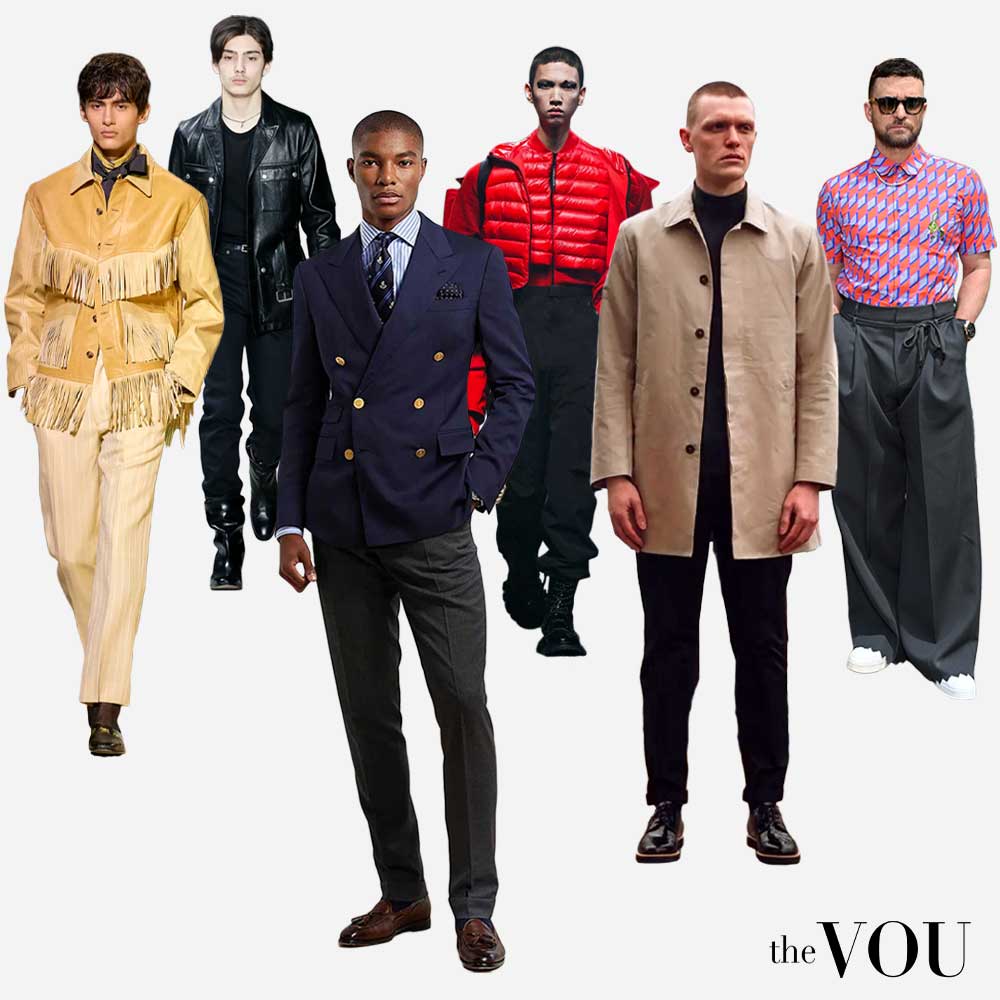 |
Don’t know your fashion style? |
Goth Aesthetic Origins
The term ‘Gothic’ first appeared in Italian literature (15th century) describing the aesthetics of Germanic tribes like Goths and Visigoths.
Later on, the term was used in relation to the “French Work” style of architecture with pointed arches, ribbed vaults, and flying buttresses giving a sense of grandeur and mystery.
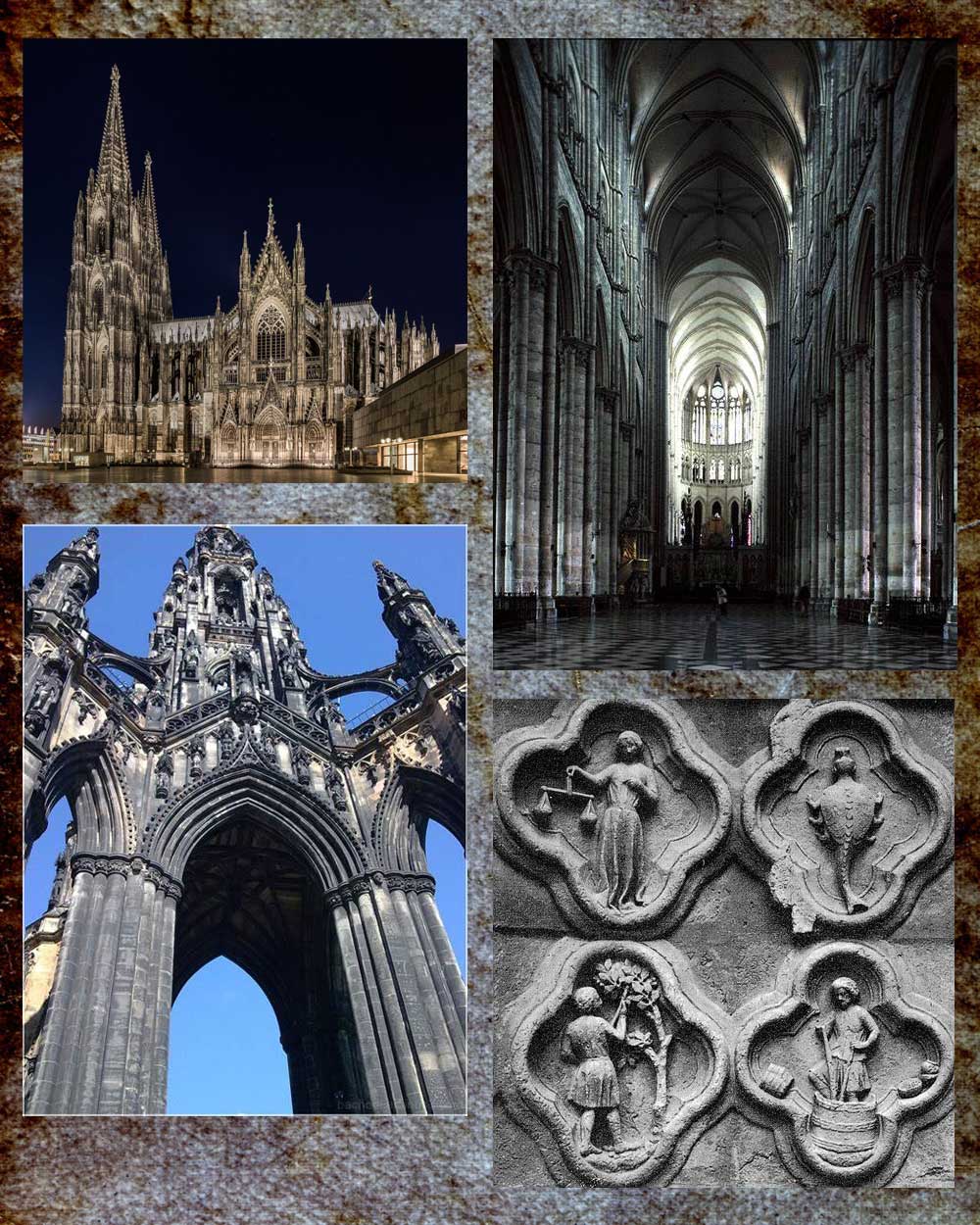
The 19th-century fiction literature revived the term “Gothic” to depict ruinous castles with gloomy churchyards, where supernatural beings, in dark, extravagant garments, lived a life of mystery, suspense, and horror.
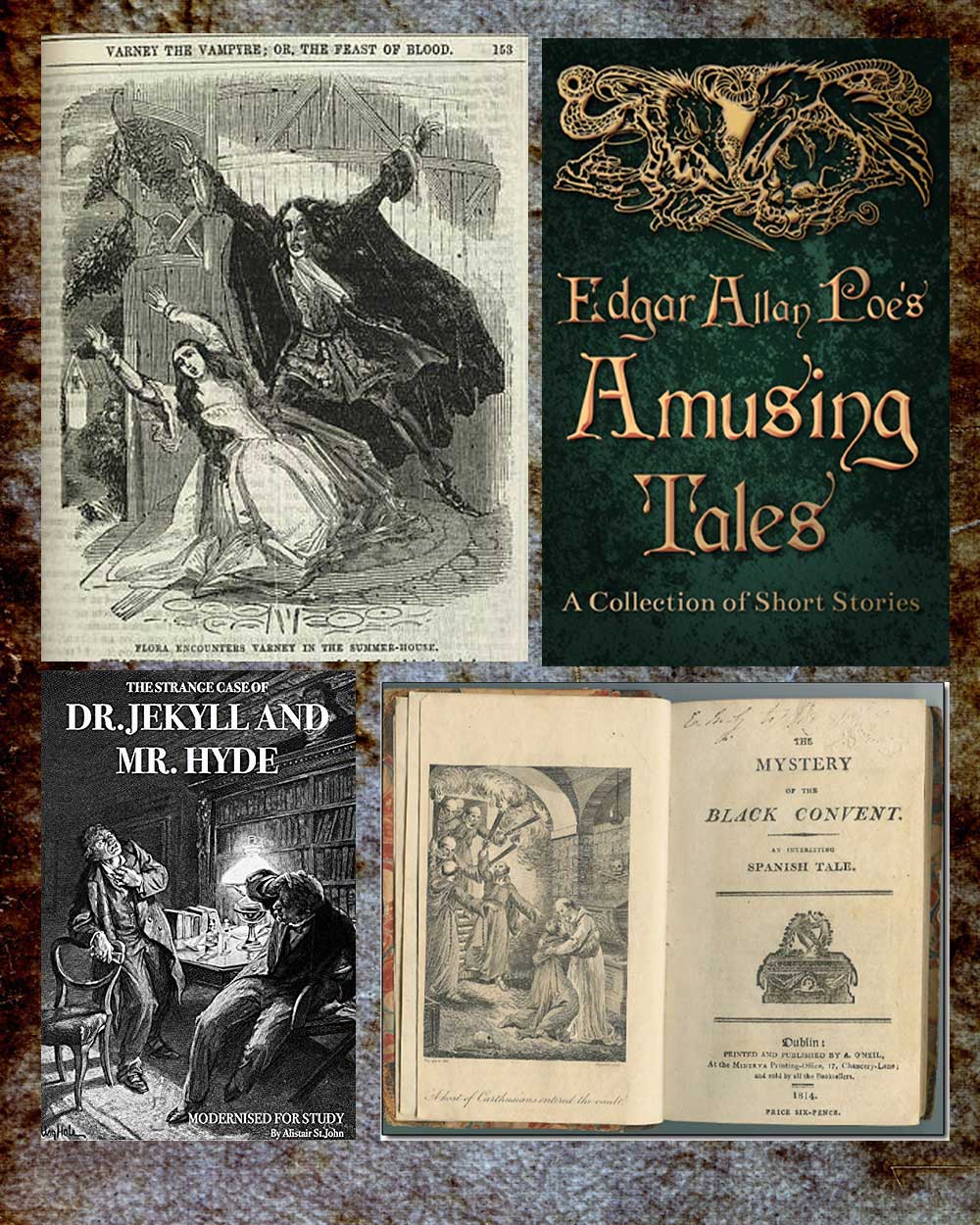
However, the first usage of the term Goth in the context of music is credited to John Stickney’s article published in a student-run newspaper, ‘The Williams Record,’ on 24th of October, 1967.
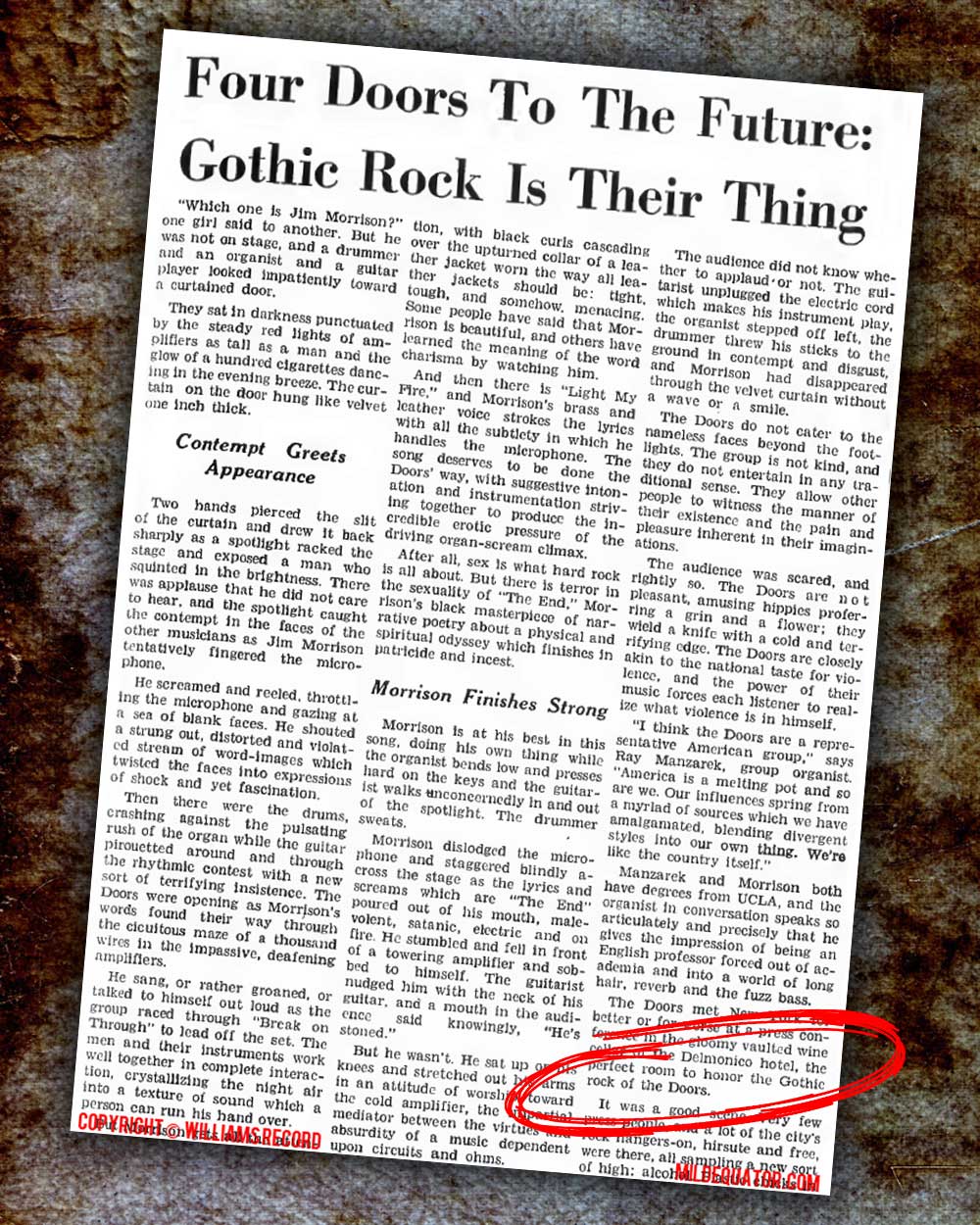
Promoted by post-punk bands such as Siouxsie and the Banshees, Magazine, and Joy Division, the Goth way of dressing started being recognised in the late 1970s as a unique style with rebellious outfits in dark garments.
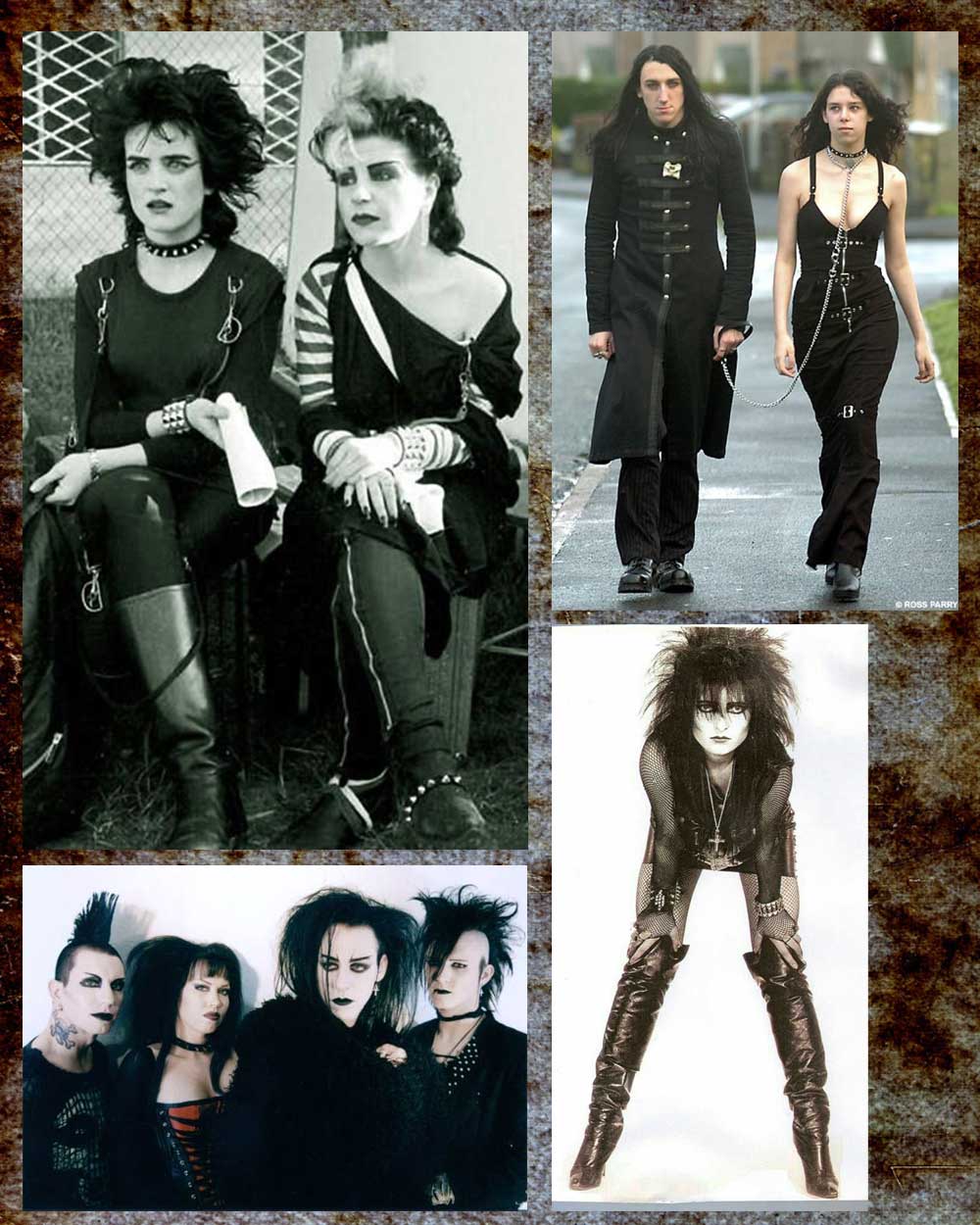
Although there’s no specific moment recognised as the inception of the Goth fashion style, the 1979 single ‘Bela Lugosi’s Dead’ by the band Bauhaus is cited as a catalyst.
Inspired by Victorian-era fashion – in particular, the mourning attire with tight black bodices over corsets and black frilled full skirts, Goth style’s unique aesthetic was at the opposite spectrum of the colourful disco genre of the 80s fashion.
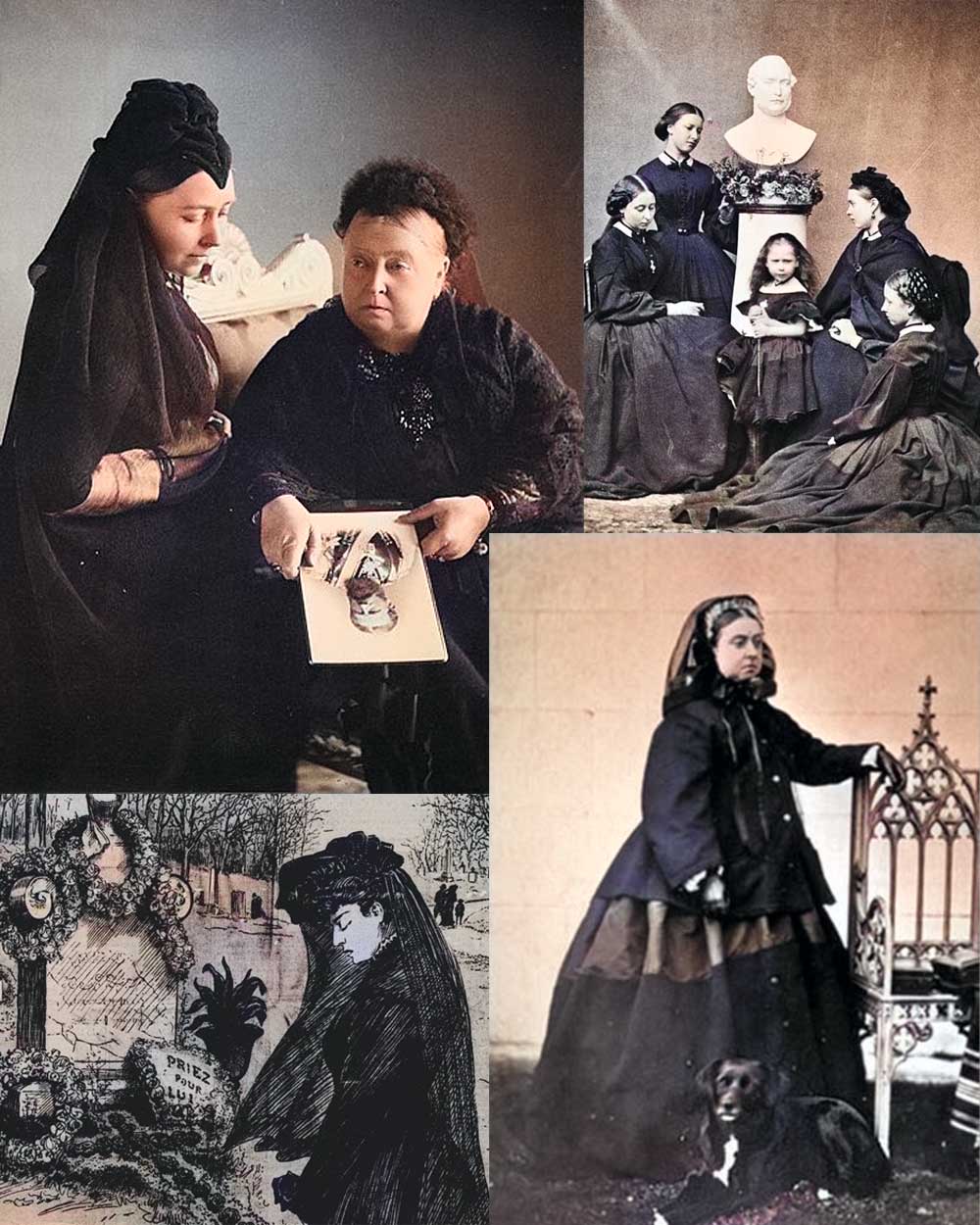
Depicting one’s dark, rebellious, extravagant, and mysterious side, Goth style allowed the wearers to distinguish themselves from others – read the “mainstream culture.”
Goth Fashion Style Across Decades
The UK’s post-punk music scene of the early ’80s – characterised by a dark, undead, androgynous aesthetic – is credited with the origins of Gothic fashion style.
While the early Goth looks were purely Victorian mourning attire-inspired, once adopted by the rock and punk subcultures and their rebellious views, the look started to change.
The Goth look became edgy, comprising combat boots, spiked wristbands, chokers, voluminous and exotic hairstyles, and the loud and heavy ‘New Romantic’ makeup style.
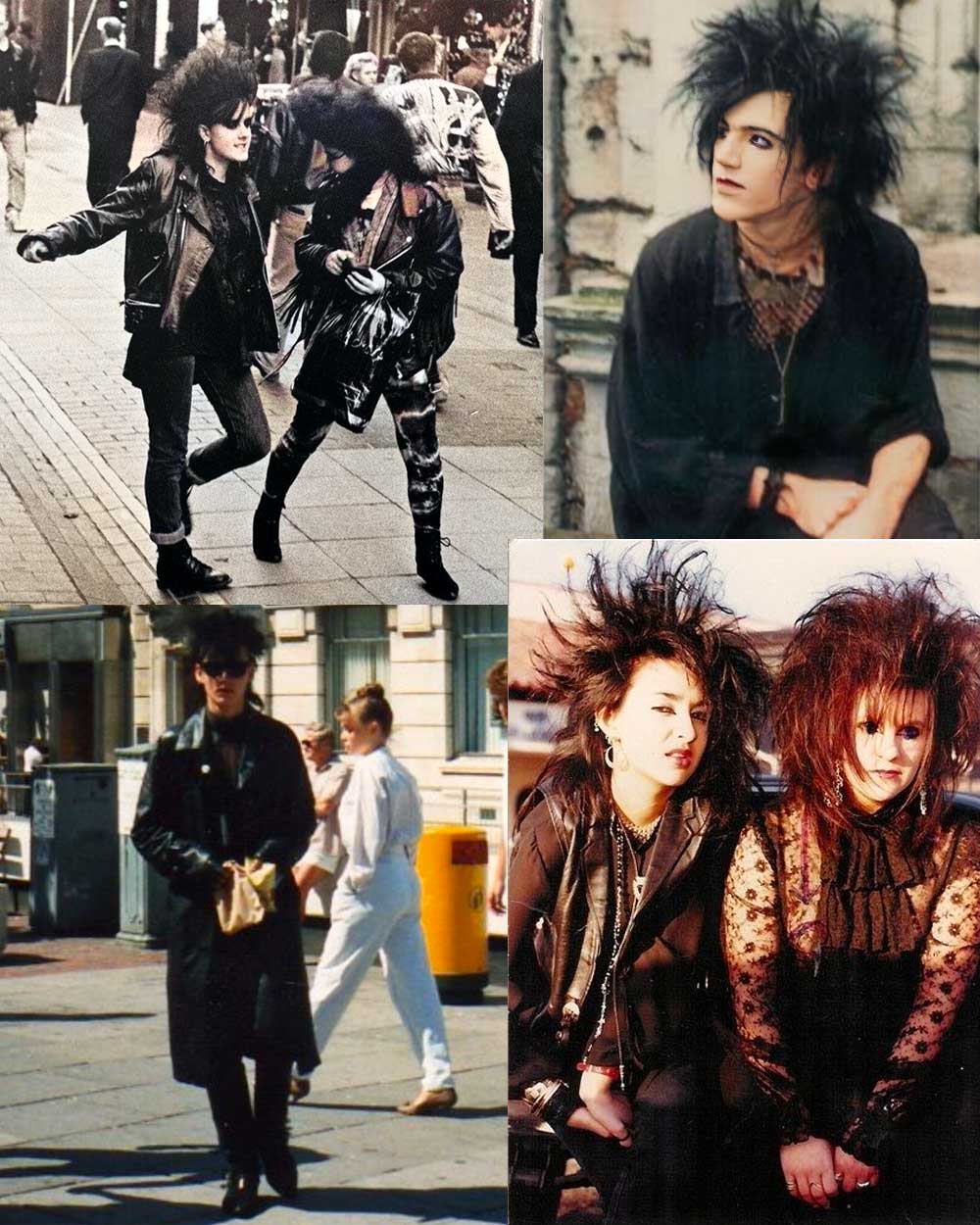
Goth Fashion in the 1980s
In the 80s, the Batcave club, an important gathering place for the Goth subculture in London’s Soho district, was pivotal in popularising the Gohtic fashion style.
During the 80s, the Goth fashion style had a moody colour palette comprised of black mourning clothes, velvet cloaks, ripped tops, leather jackets, distressed leather pants, and black jeans.
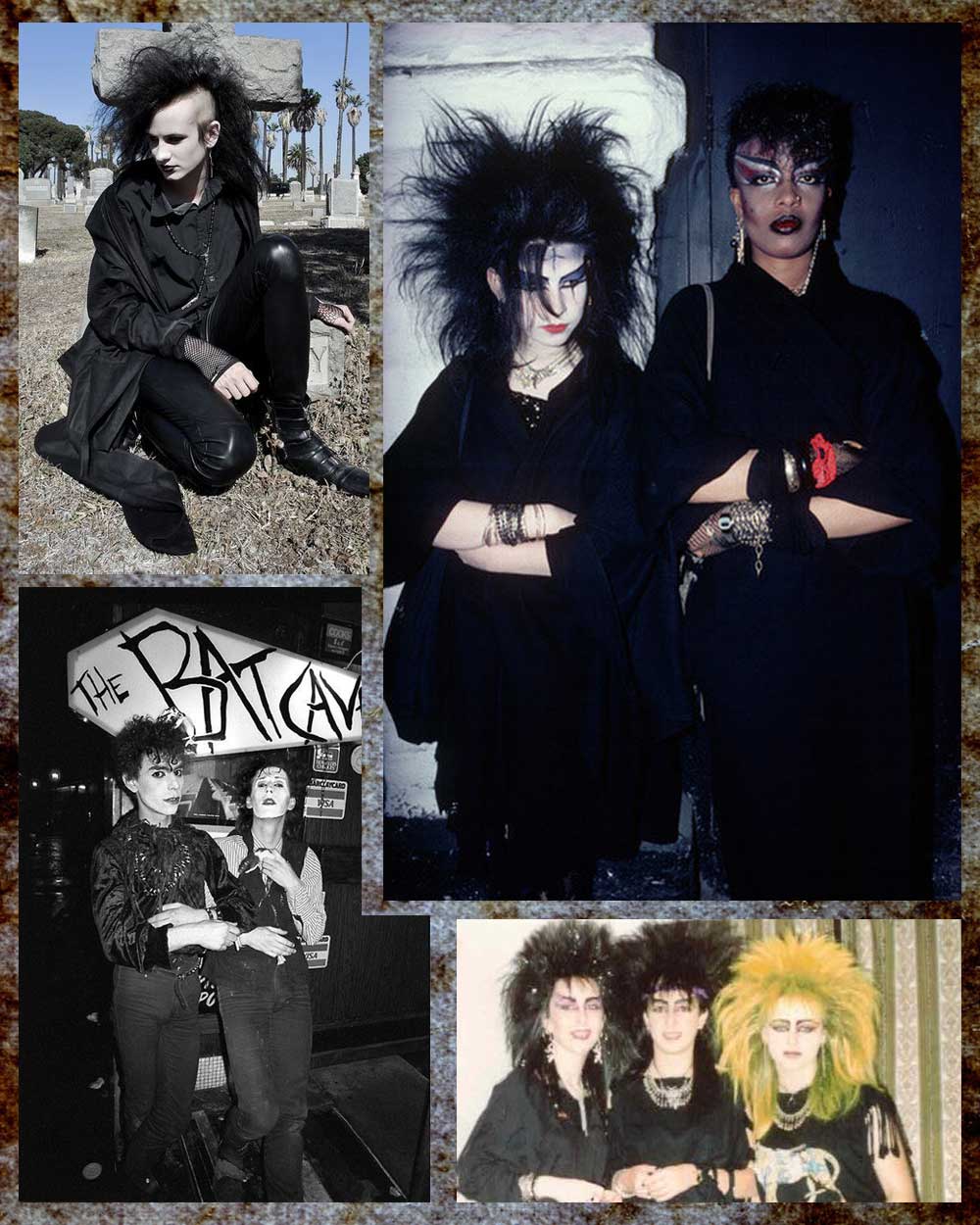
The gothic dressing style was augmented with dark eyeliner and lipstick, teased or spiked hair, fishnets or ripped stockings, and sturdy footwear, especially black leather Doc Martens or winklepicker boots.
Sioux of ‘Siouxsie and the Banshees’, dubbed “The Mother of Goth,” was instrumental in popularising the Goth look in the 80s.
Her gothic look comprised distressed black leather clothing, fishnet stockings, combat boots, spiked and leather wristbands, cat-eye makeup, deep red lipstick on pale skin, and voluminous, teased hair.
Goth fashion style for men was shaped by gothic rock musicians like Peter Murphy of Bauhaus (the “Godfather of Goth”), Robert Smith of The Cure, and Nik Fiend (alias Jonny Slut) of Alien Sex Fiend.
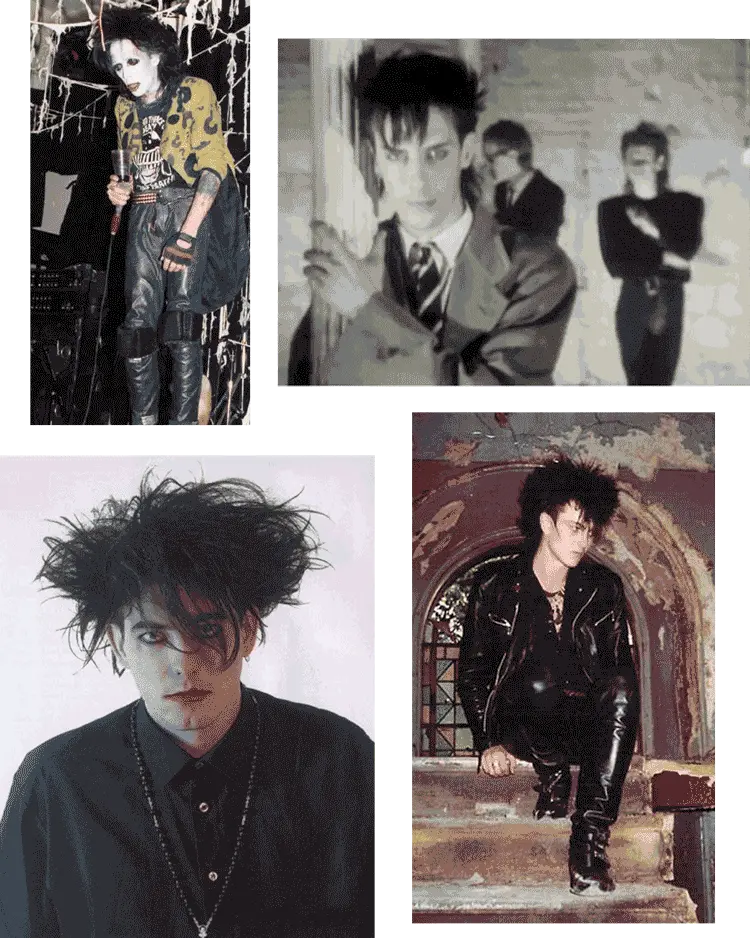
The look comprised dark suits, ripped T-shirts, black leather jackets or overcoats, leather pants or black jeans, and combat boots or black leather ankle winklepickers.
The decade’s makeup and hairstyle echoed the trends seen among female goths: dark eyeliner, pale skin, dark red lipstick, and teased hair.
Goth Fashion in the 90s
During the 1990s, mass media started promoting the gothic aesthetic and fashion style via thematic movies, Goth stories, and TV shows.
More music bands and celebs adopted the Goth fashion style, even if their music wasn’t Goth, with some of the most famous being Marilyn Manson, PJ Harvey, Manic Street Preachers, and Nine Inch Nails.
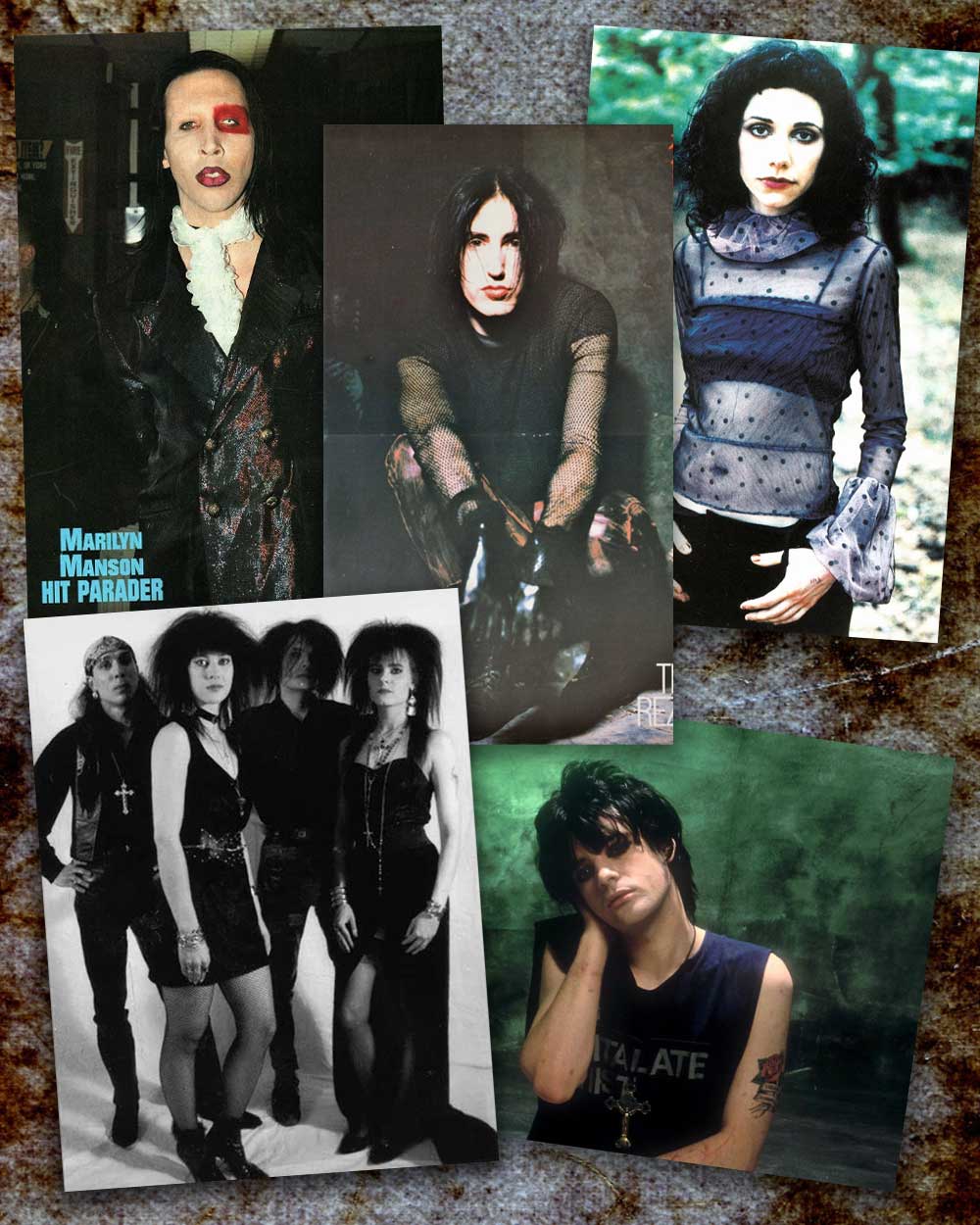
Movies and TV shows like “Edward Scissorhands” (1990), “The Addams Family” (1991 – 1998), “The Craft” (1996), and “Sleepy Hollow” (1999) promoted the Goth subculture into the mainstream.
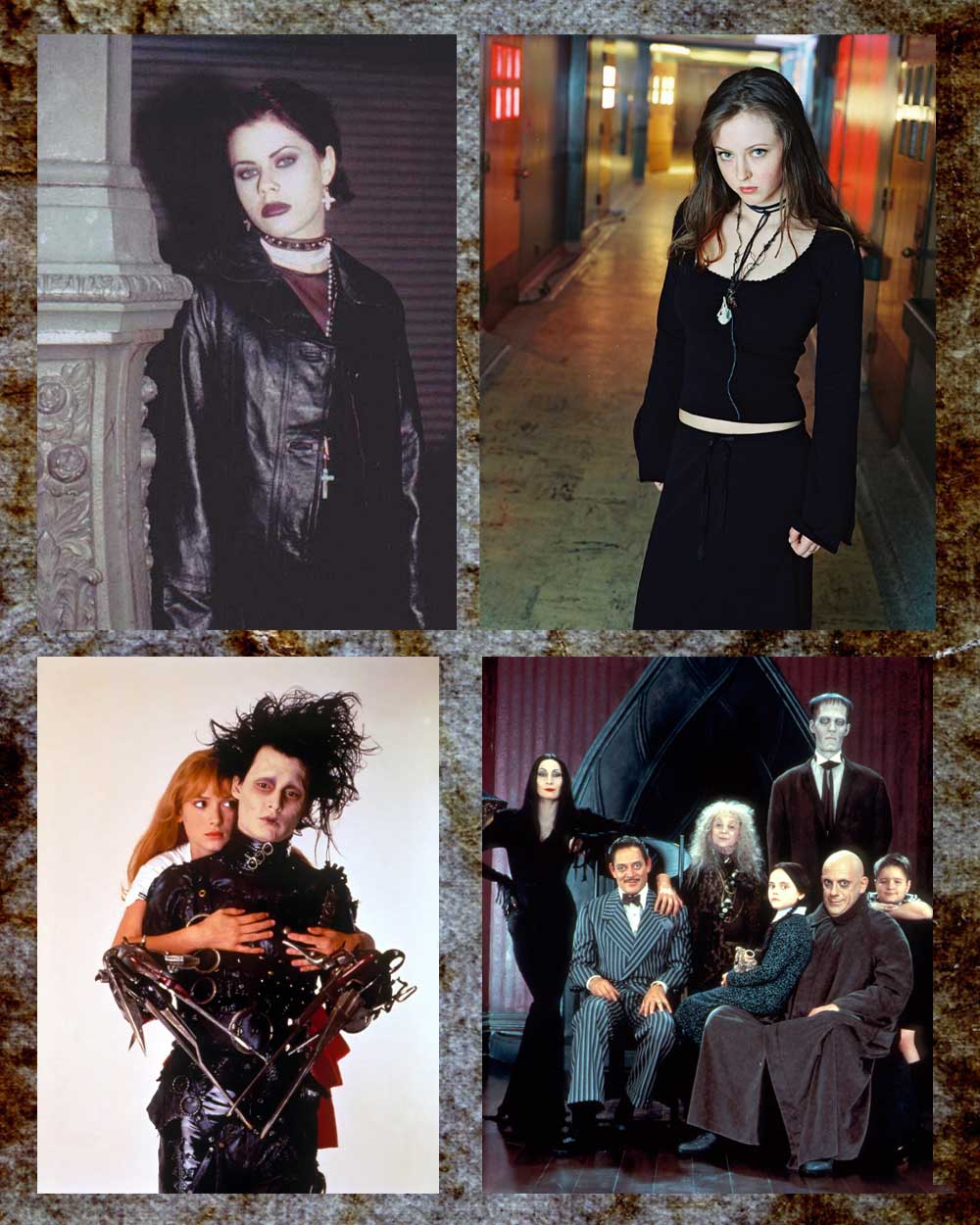
The Goth look of the 90s was influenced by Grunge, Emo, Industrial, and Dance subcultures, hence the adoption of plain mini skirts and cropped tops adorned with laces and neon stripes.
The popularity of the Goth subculture and style in the 90s inspired high-end designer labels to incorporate gothic aesthetics into their collections.
Some of these iconic collections are Jean Paul Gaultier Spring 1994, Comme des Garçons Fall 1997, Alexander McQueen Fall 1997, Balenciaga Fall 1998, and Olivier Theyskens Spring 1999.
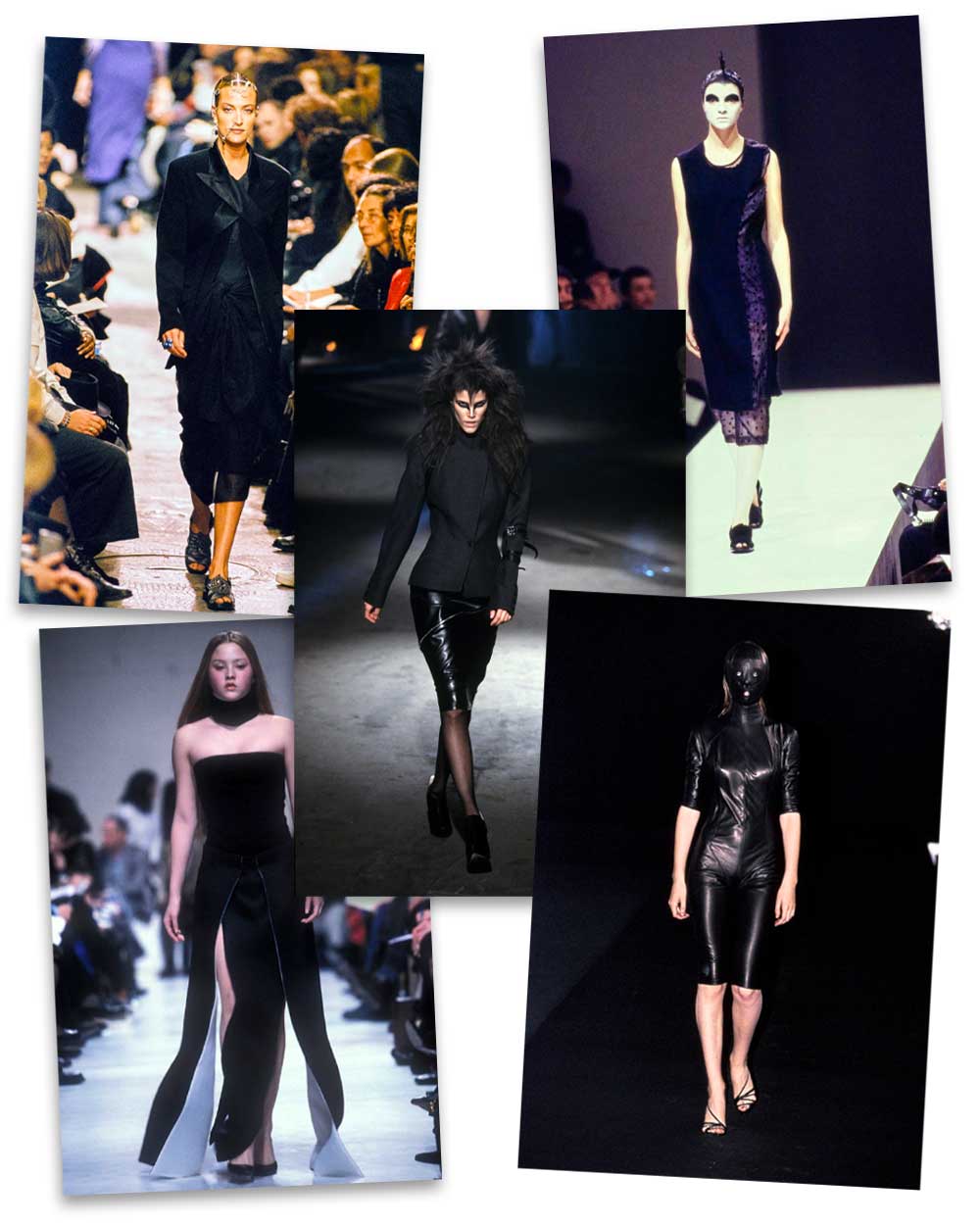
By the end of the 90s, Goth substyles like Mall Goth – a combo of goth and mainstream garments, and Cybergoth, a fusion of classic Goth with rave and industrial aesthetics emerged.
Goth Fashion in the 2000s
The 2000s brought a renewed focus on the early Goth fashion style and classic black and red colour palette, seen in striped over-the-knee socks, black corsets with red embroidery and decoration, and black and red eyeshadows.
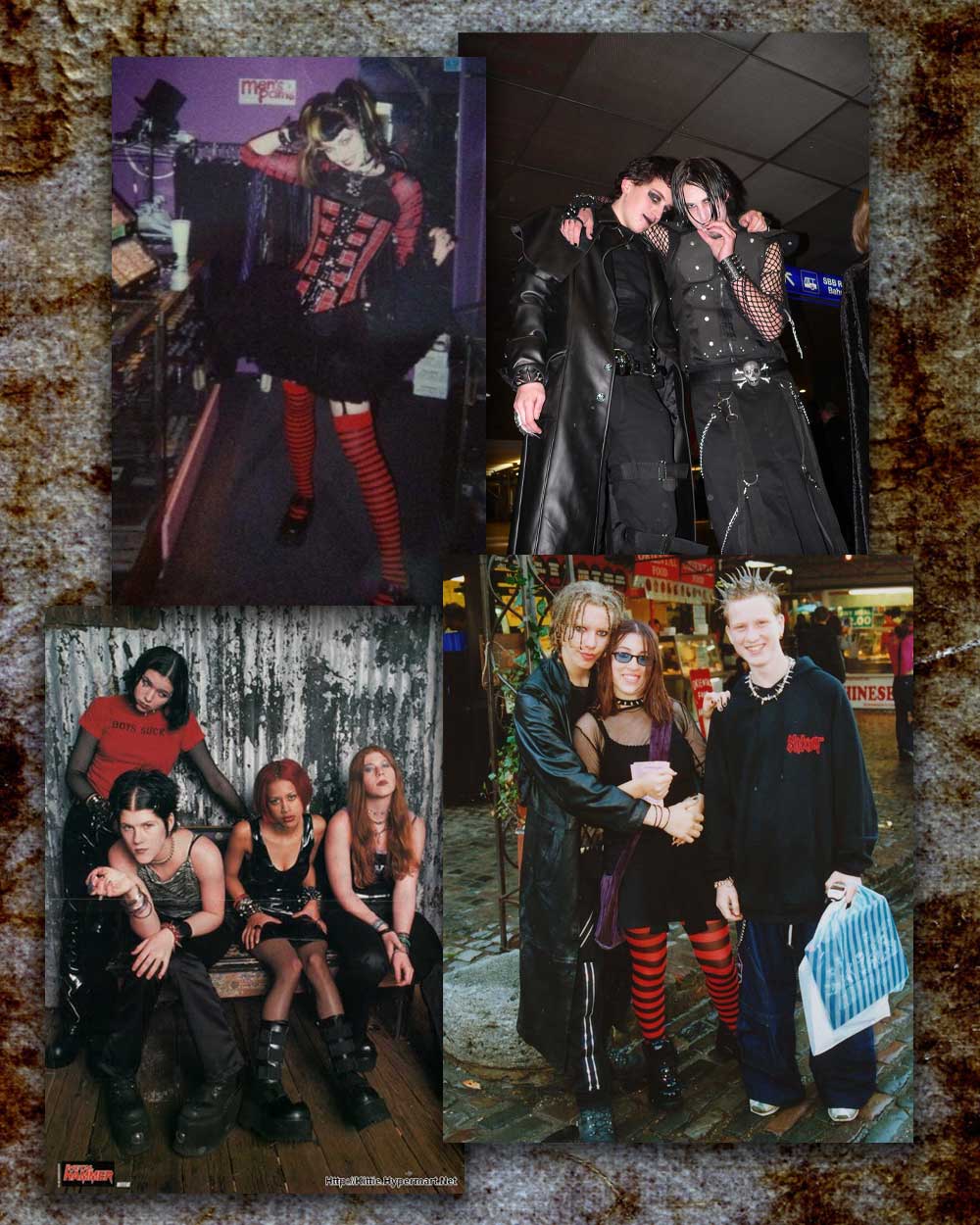
In the 2000s, there was also a shift in the approach to Goth-style eyebrows towards a thin or shaved look and hairstyles departing from dyed black hair to dual-tone hair colours and dreadlocks.
Cut-out gloves remained an essential Goth look accessory, ideal for complementing gothic outfits. Similarly, Italian charm bracelets with gothic motifs like crosses or skulls were a popular customisable wrist accessory during this era.
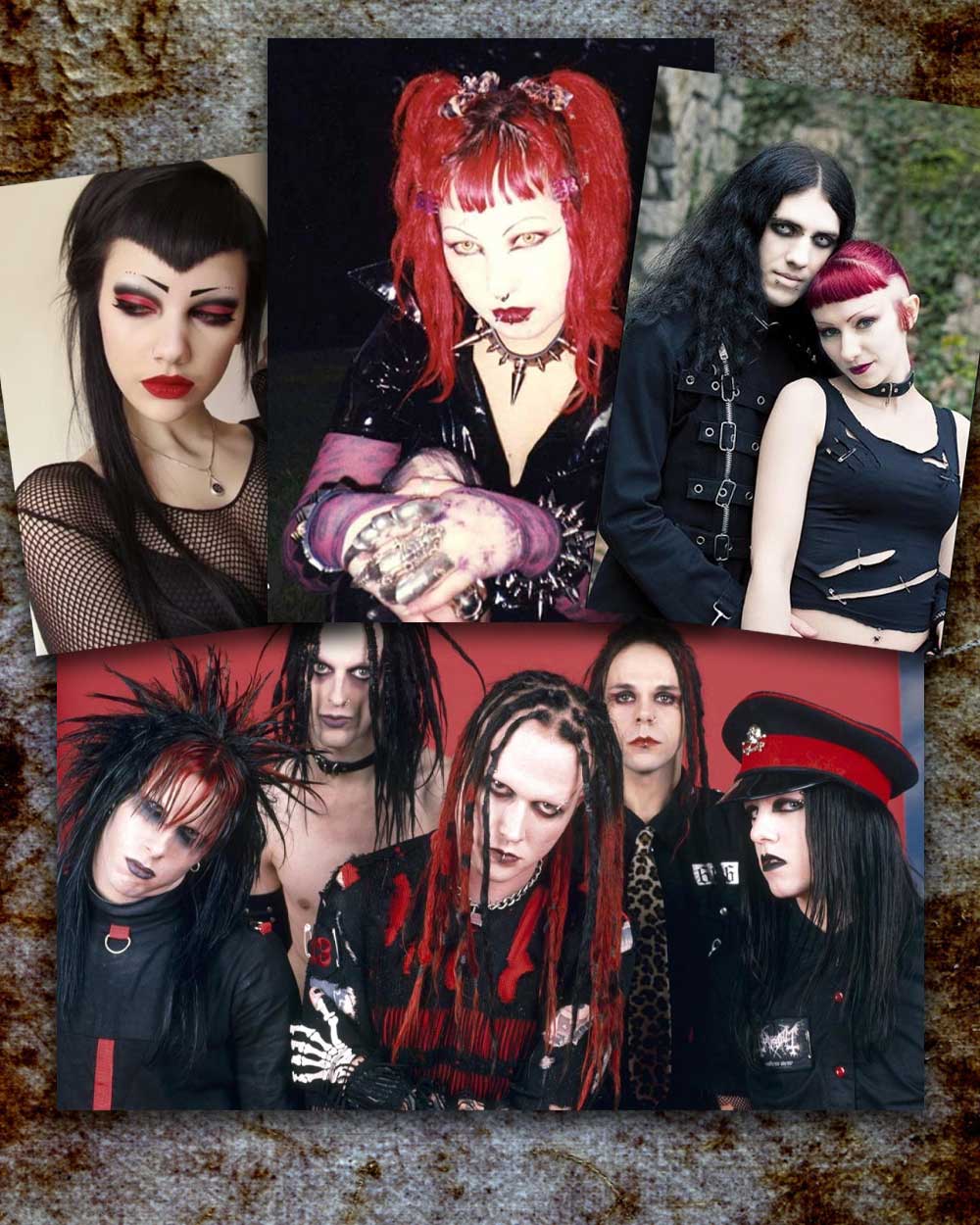
The style’s aesthetic return to its Victorian-era roots saw new variations of the classic Gothic style emerging in the mid-2000s, up to the early 2010s.
Among these variations are the Gothic and Japanese Lolita styles that combine the dark patterns and motifs of Victorian Goth aesthetic with the elegance and cuteness of Lolita style.
Other notable variations included SteamGoth and the gothic interpretation of Steampunk style, both depicting a blend of historical patterns with a futuristic, industrial vibe.
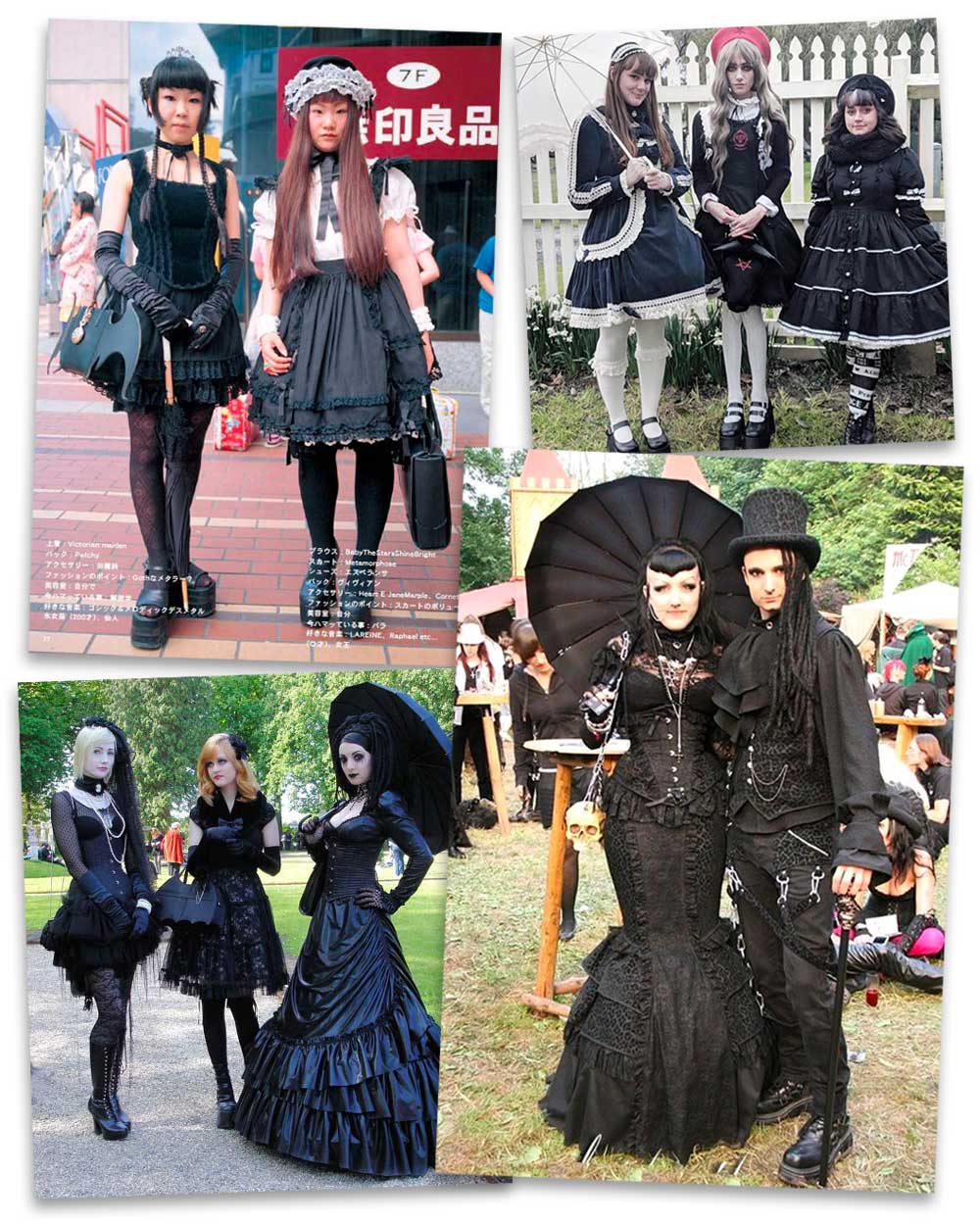
While in the 80s and 90s, Goth clothing was DIY, during the late 90s to mid-2000s, Goth clothing brands such as Tripp NYC and online stores like Hot Topic became very popular, particularly among Mallgoths in the US.
Goth Fashion in the 2010s
The 2010s witnessed the rise of Corp Goths, a term coined to describe early Goths who now, in their late 30s and 40s, were living a corporate life.
The Goth corporate aesthetic and style were adapted to office wear: grey blazers, black button-up shirts, formal black trousers with silver zippers, black ties, and less voluminous haircuts.
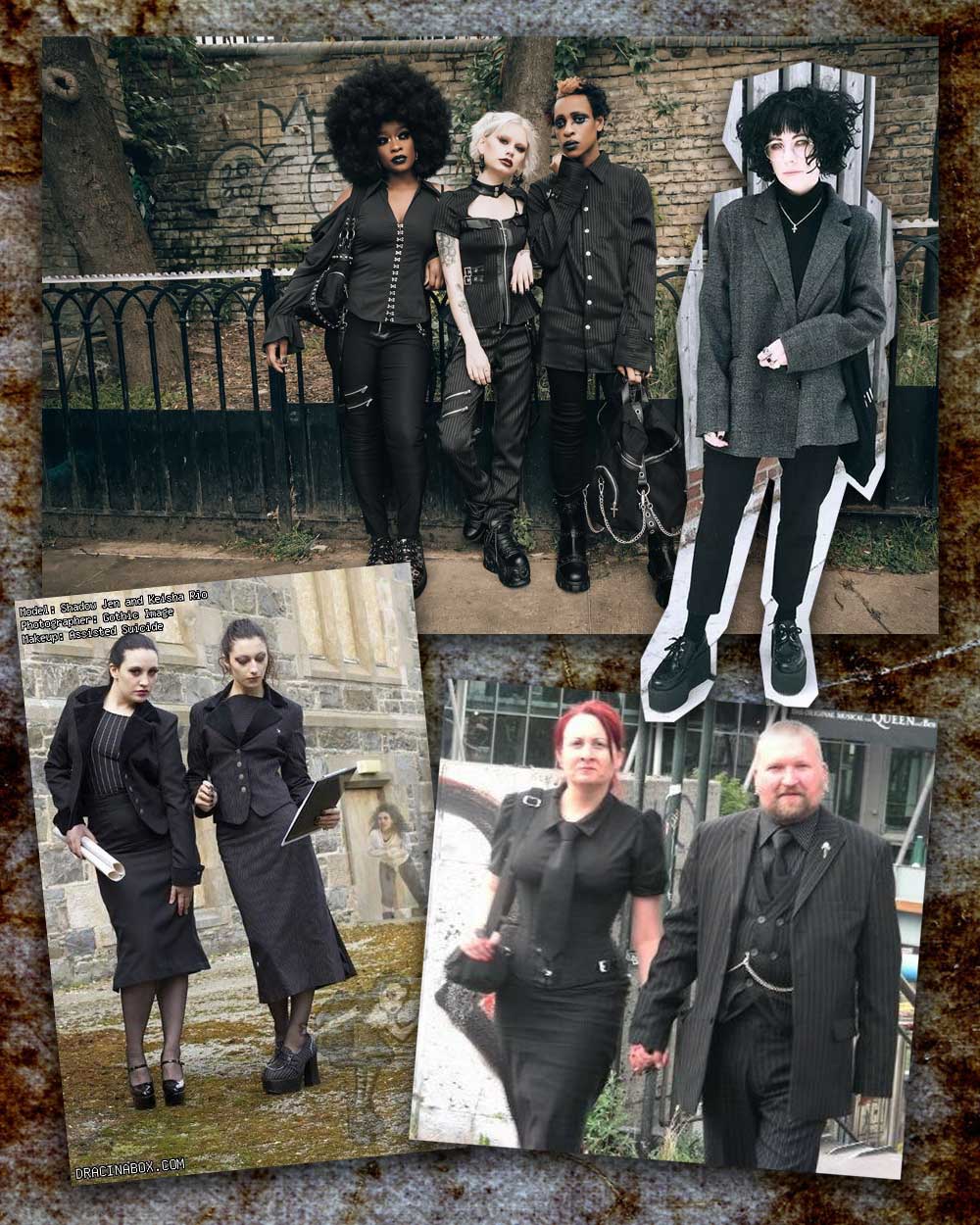
The decade’s end was the impact of E-boy and E-girl – young online gamers – popularising Pastel Goth style on online communities like Tumblr and VK.
The Pastel Goth substyle fuses Goth fashion with Kawaii (‘cute’) aesthetics of Japanese anime and cosplay, favouring softer hues like lavender and baby pink.
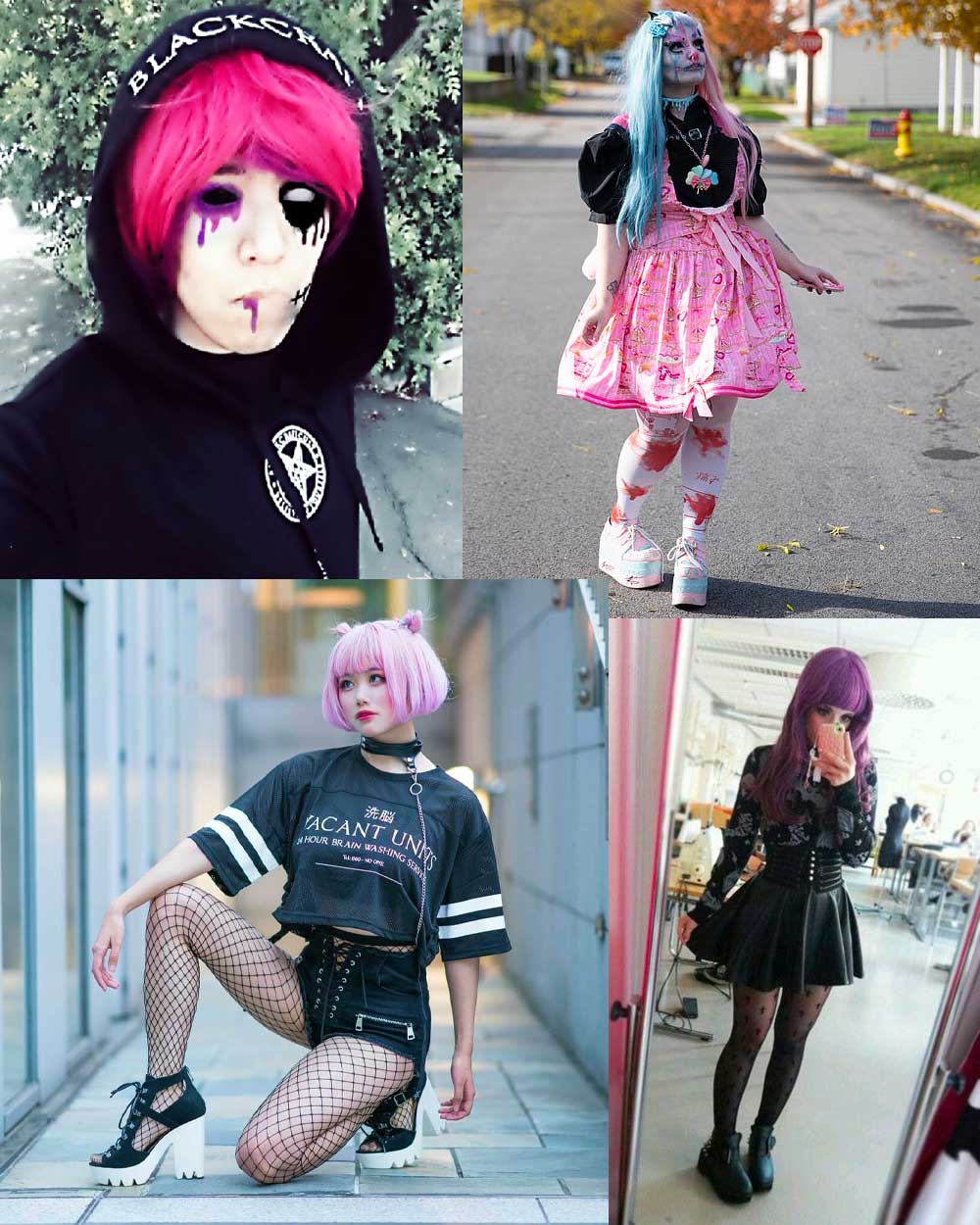
The growing hip-hop and street culture of the late 2010s impacted and diversified the Goth fashion style.
Health Goth emerged as a fusion of athleisure wear and gothic aesthetics, prioritising black sportswear and sleek, futuristic designs.
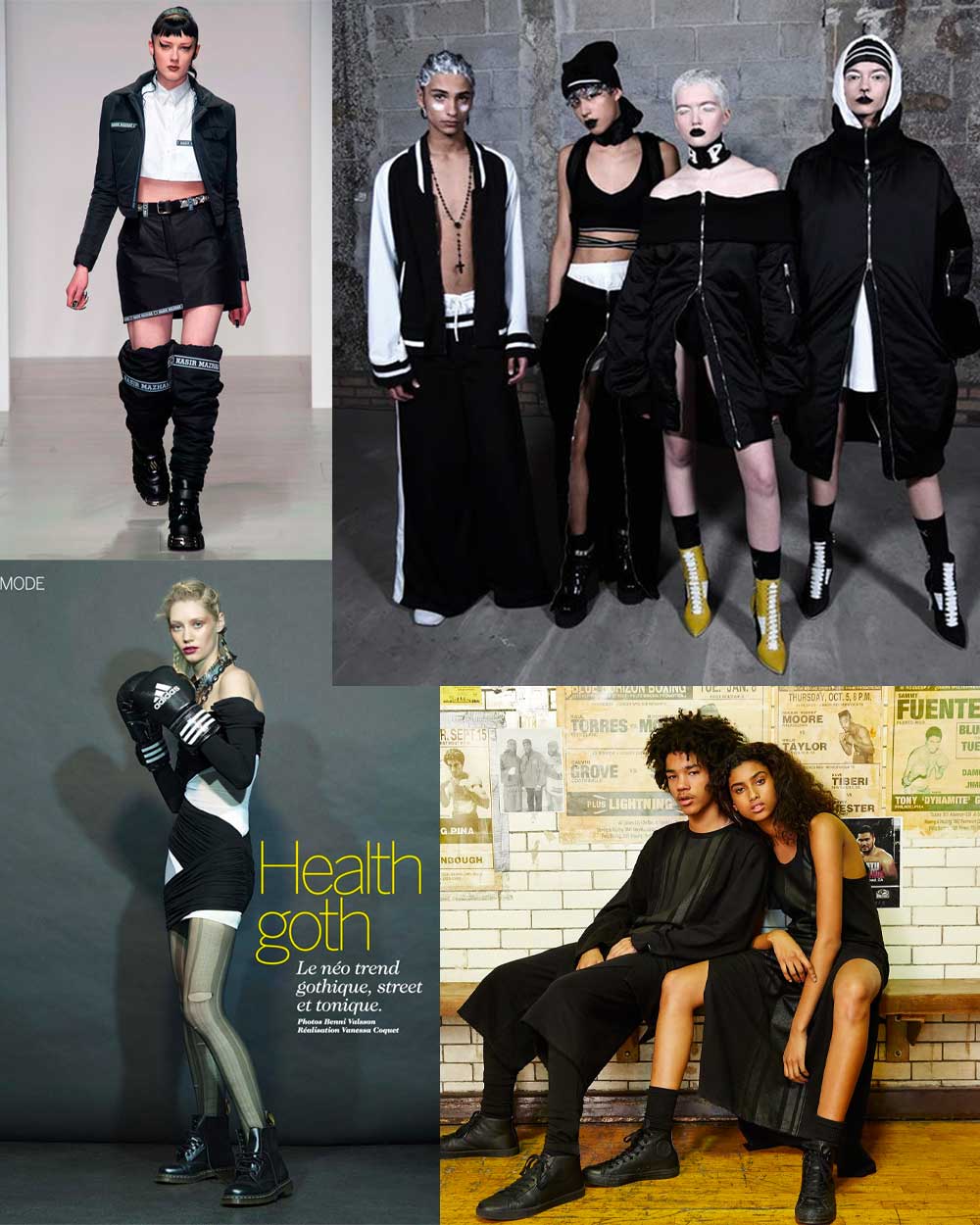
Ghetto Goth, another substyle that emerged during this decade, combined streetwear’s practicality and casualness with the dark aesthetics and symbols of Goth fashion.
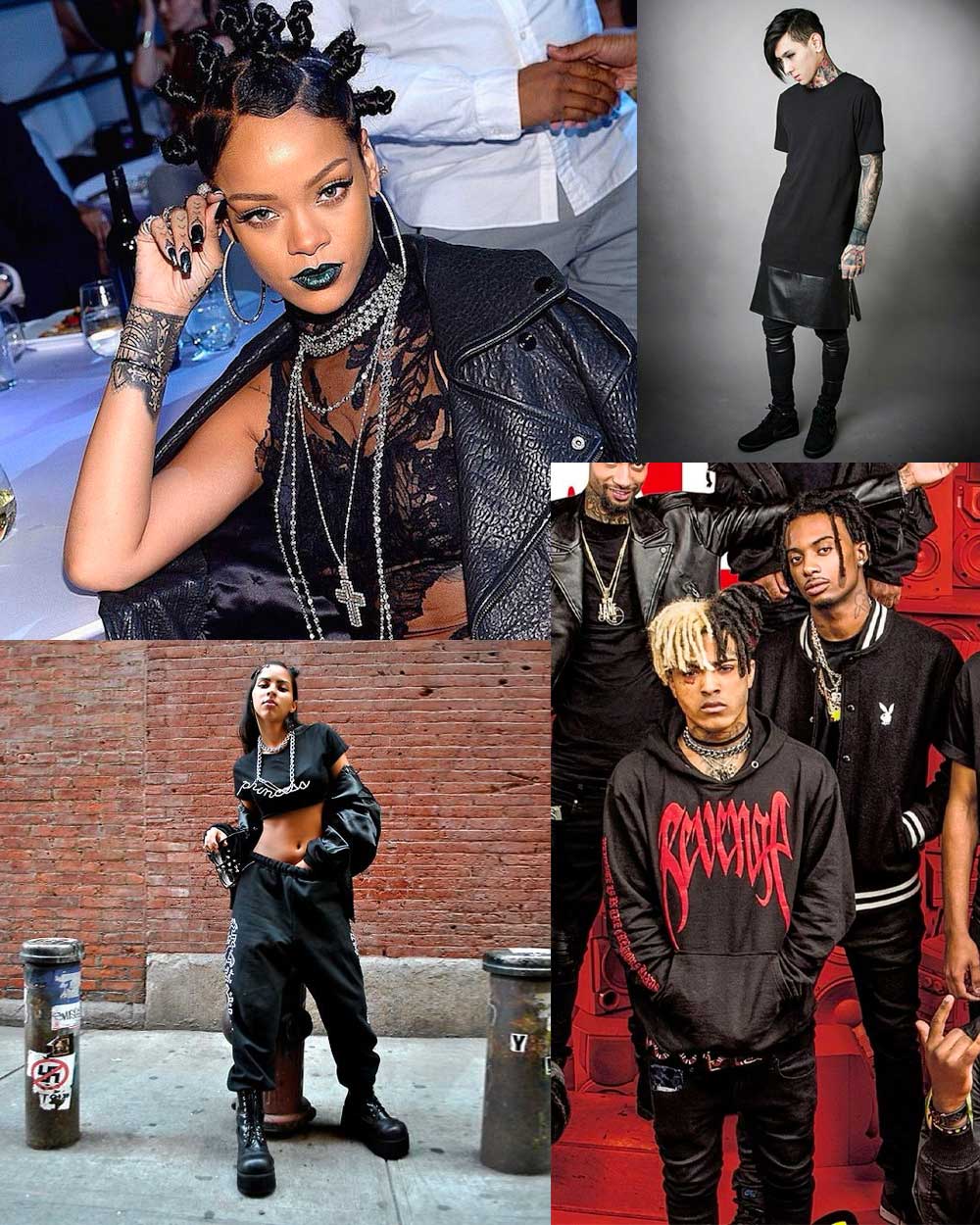
Modern Goth Fashion Style
The modern iteration of Goth style is characterised by experimentation, reflected in black see-through mourning lace dresses, intricately embroidered hoop skirts, white spiked collars, and black and red plaid Lolita dresses.
Leather layering, a technique employed by designer Noir Kei Ninomiya, has also found its place in the current Goth wardrobe.
The current style has adopted lace mourning veils, mismatched leg warmers, platform boots and sneakers, silver chains, tribal accessories, and matrix sunglasses in a unique aesthetic of modern Goth.
Makeup is dramatic, with exaggerated black winged eyeliner, hairstyles from side-shaved cuts to shaved eyebrows, and long spiky nails.
Another significant variation was the Tribal Goth fashion style, which merged traditional Goth aesthetics with themes reminiscent of belly dancing.
This fusion adds a unique dynamic to the Goth fashion style, keeping the dark aesthetics intact while integrating diverse cultural influences.
What is Haute Goth?
“Haute Goth” is a recent term used to describe the high fashion creations and runway collections that use Gothic fashion as the primary source of inspiration.
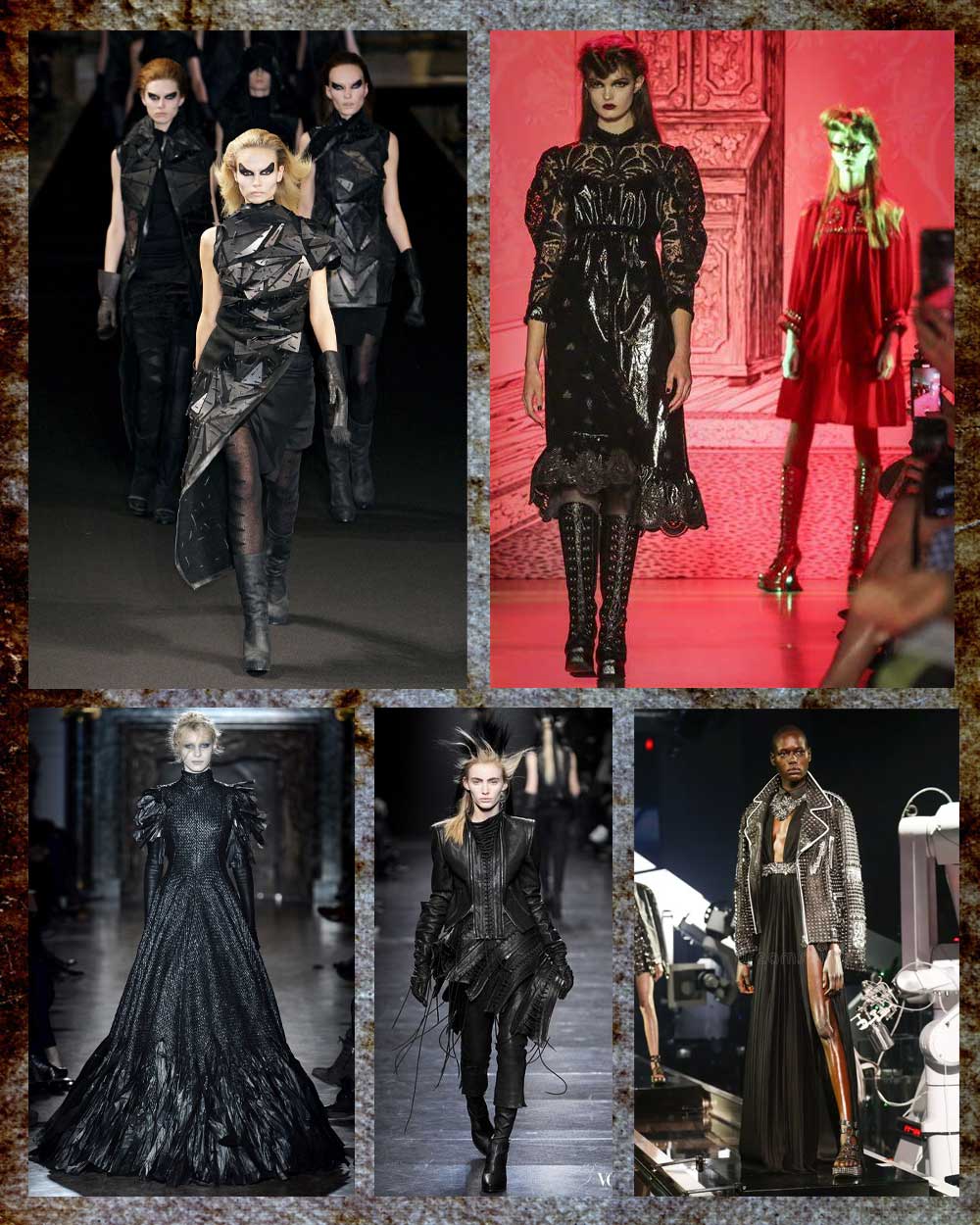
25 Goth Fashion Styles and Variations
From the romantic whispers of Victorian style to the rebellious spirit of punk fashion and the futuristic looks of Cybergoth, each goth substyle here screams macabre, romanticism, and unconventional.
1. Romantic Goth
Romantic Goth emerged as a distinct sub-subculture within the Goth scene in the ’90s as a way of dressing influenced by the dramatic flair of Victorian and Georgian styles.

With aesthetics rooted in Victorian and Gothic literature, the Romantic Goth style blends the dark looks of traditional Goth with the elegance of the Georgian and Victorian eras.
Romantic Goth colours revolve around black with accents of deep reds, purples, and midnight blues, evoking a sense of melancholy and vintage refinement.
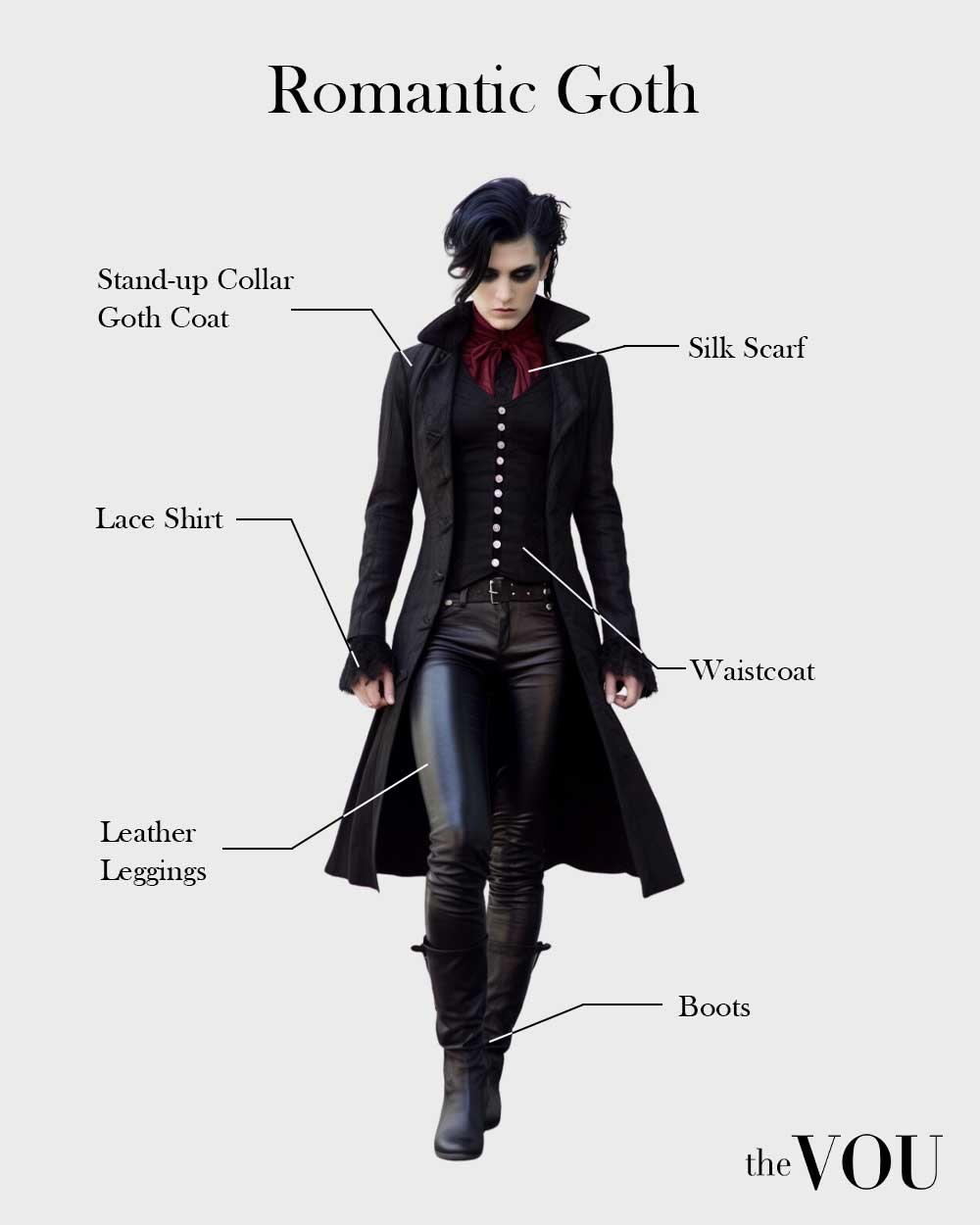
Inspired by 19th-century Romantic literature, particularly the works of Edgar Allan Poe, Bram Stoker, and Lord Byron, the look comprises lacework, velvet gowns, black dresses, and Victorian-style corsets.
Men’s Romantic Goth attire includes ruffled shirts, velvet jackets, and brocade waistcoats, capturing the Victorian influence.
2. Southern Goth
Rather than focusing on the supernatural or the fantastical, Southern Goth fashion is inspired by real-world events and societal issues like racism and sexism in the American South during the 1800s.

In a unique blend of traditional Gothic attire with aesthetic influences of the American South, the main colour is black, accented with burgundy, brown, and dark green, reflecting the natural hues of the Southern landscape.
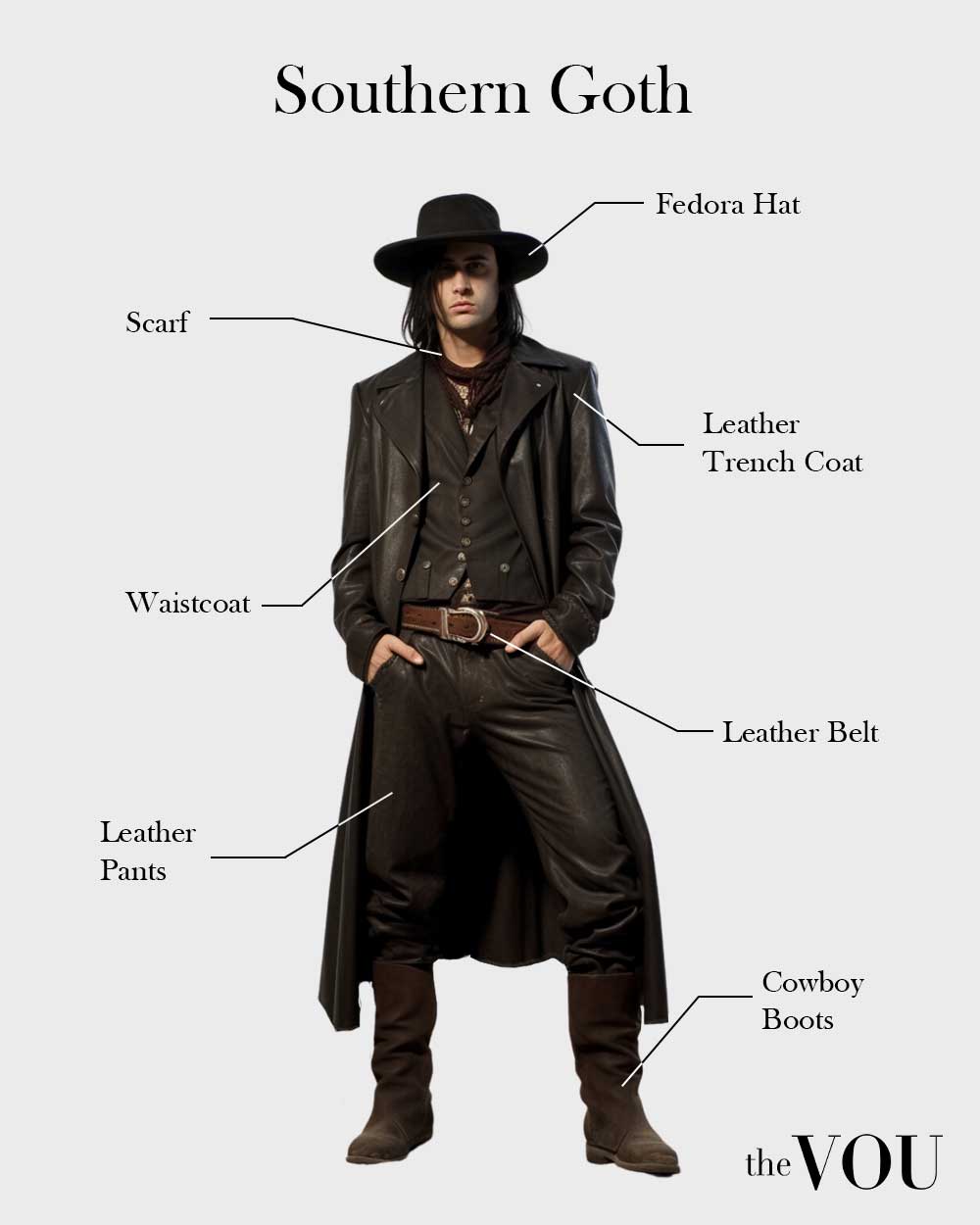
Men’s Southern Goth attire is characterised by dark, tailored suits and vintage-inspired shirts paired with vests from brands like Gentleman’s Emporium.
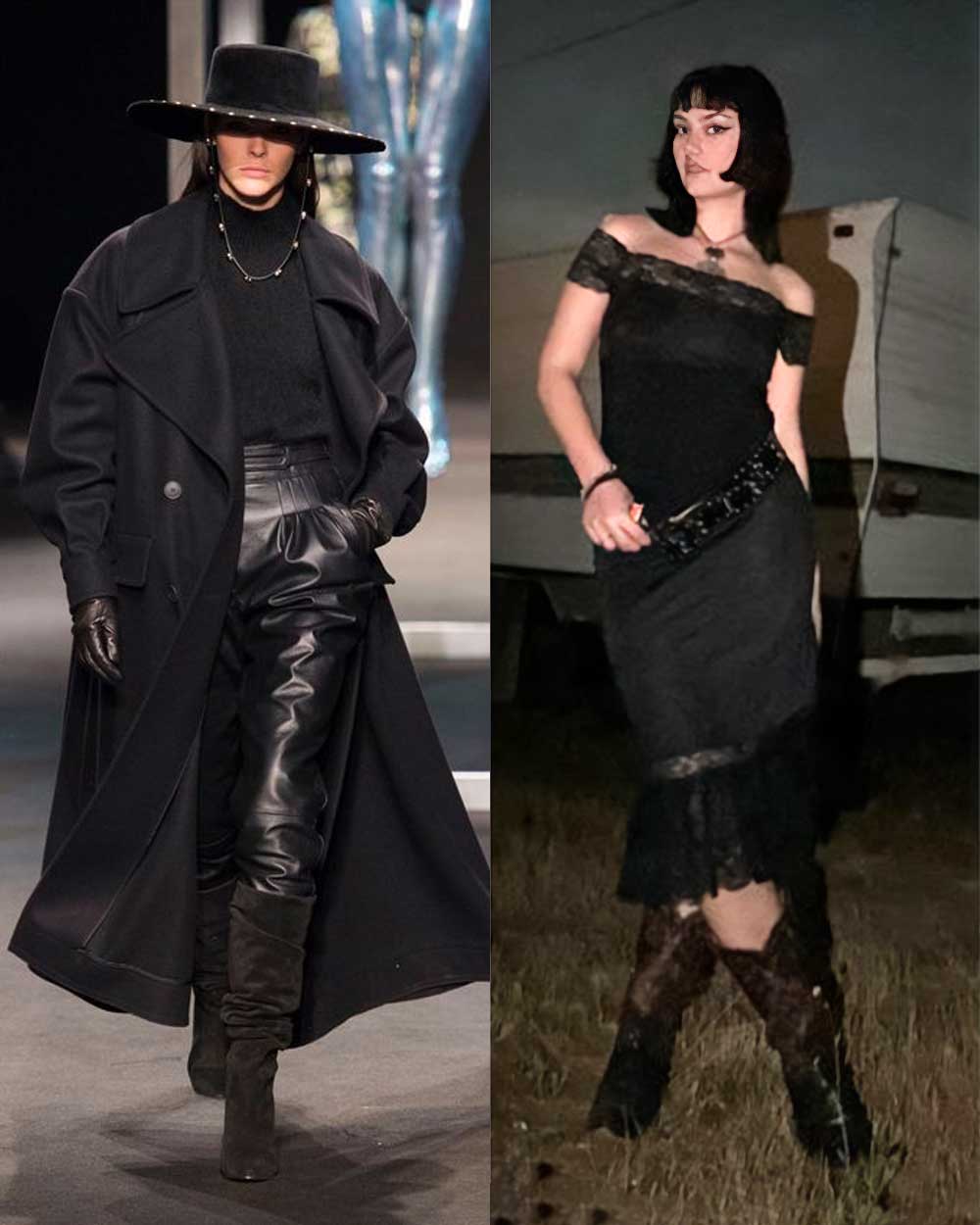
3. Soft Goth (Casual Goth)
Soft Goth, or Casual Goth, delivers a subdued approach to Gothic fashion.

It infuses the traditional Gothic style with grey and natural pastels, creating a less intense but still distinctly Gothic look.
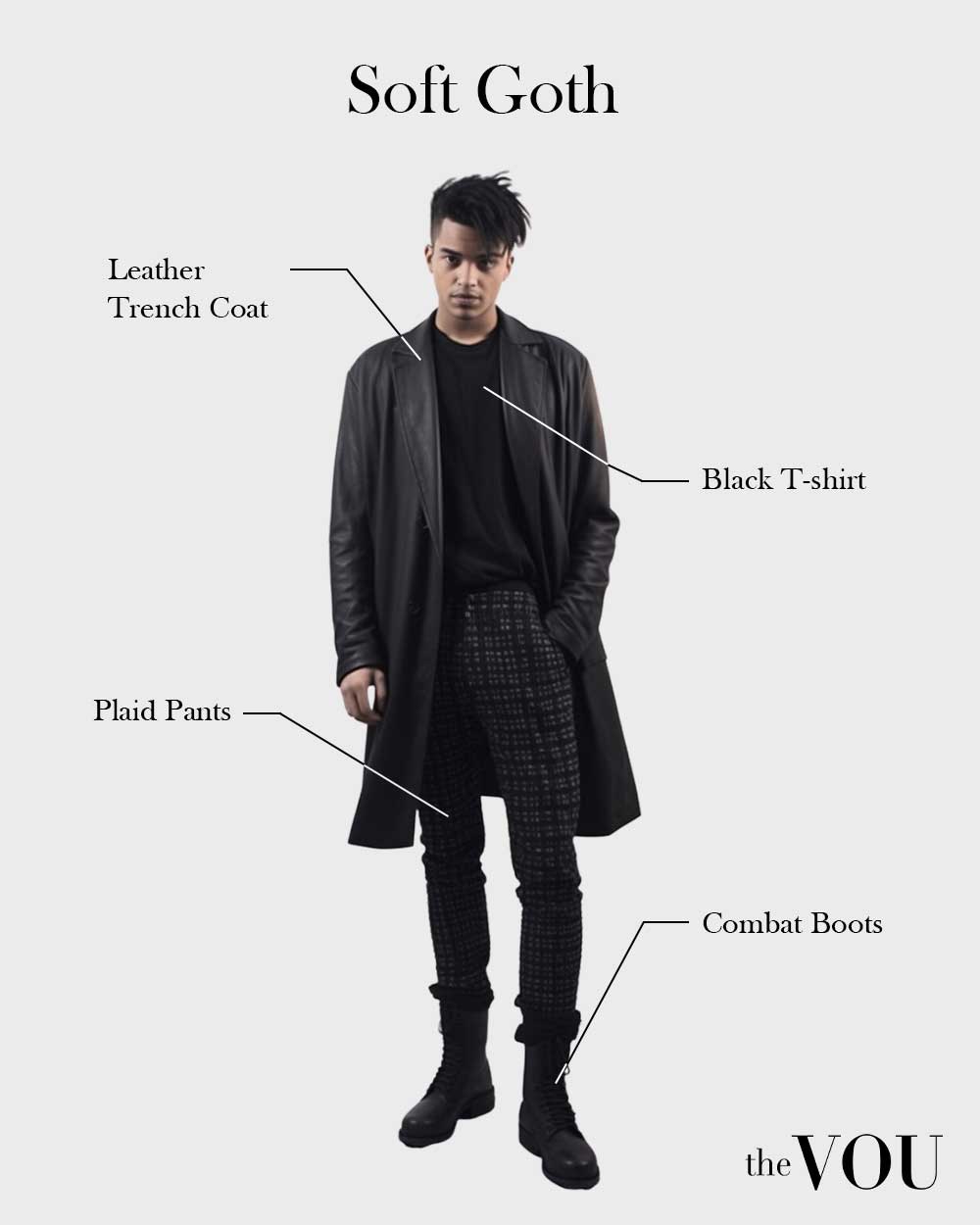
4. Vampire Goth
Drawing aesthetics from folklore and mythology, Vampire Goths identify with and imitate vampires.

Vampire Goths are influenced by iconic vampire-themed movies like Nosferatu and Bram Stoker’s Dracula.
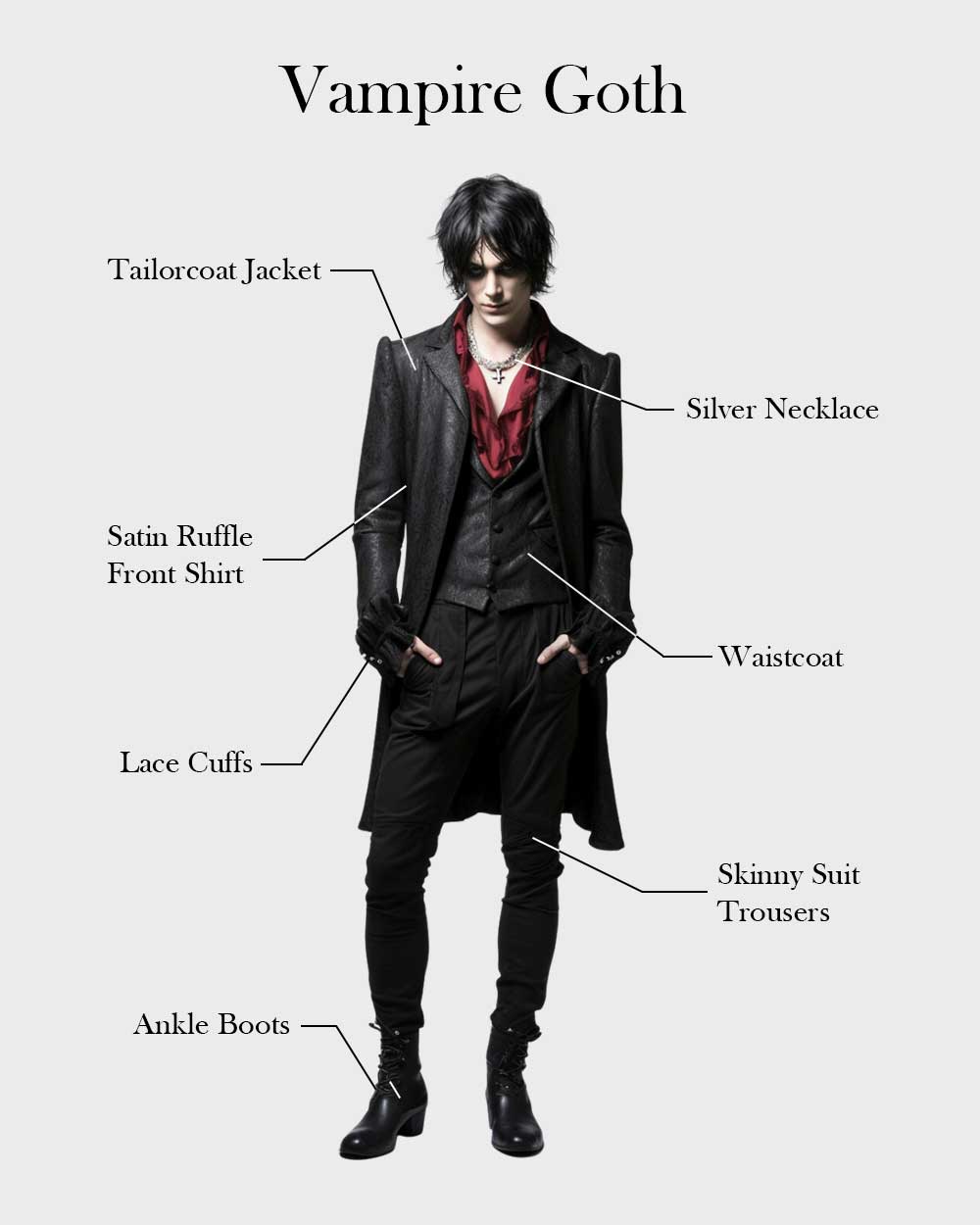
The subculture occasionally uses blood-like makeup on Goth clothes and faces, particularly during Vampire Goth parties.
One of the most striking features of this subculture is the modification of teeth, as Vampire Goths sharpen their teeth to mirror the iconic vampire fangs.
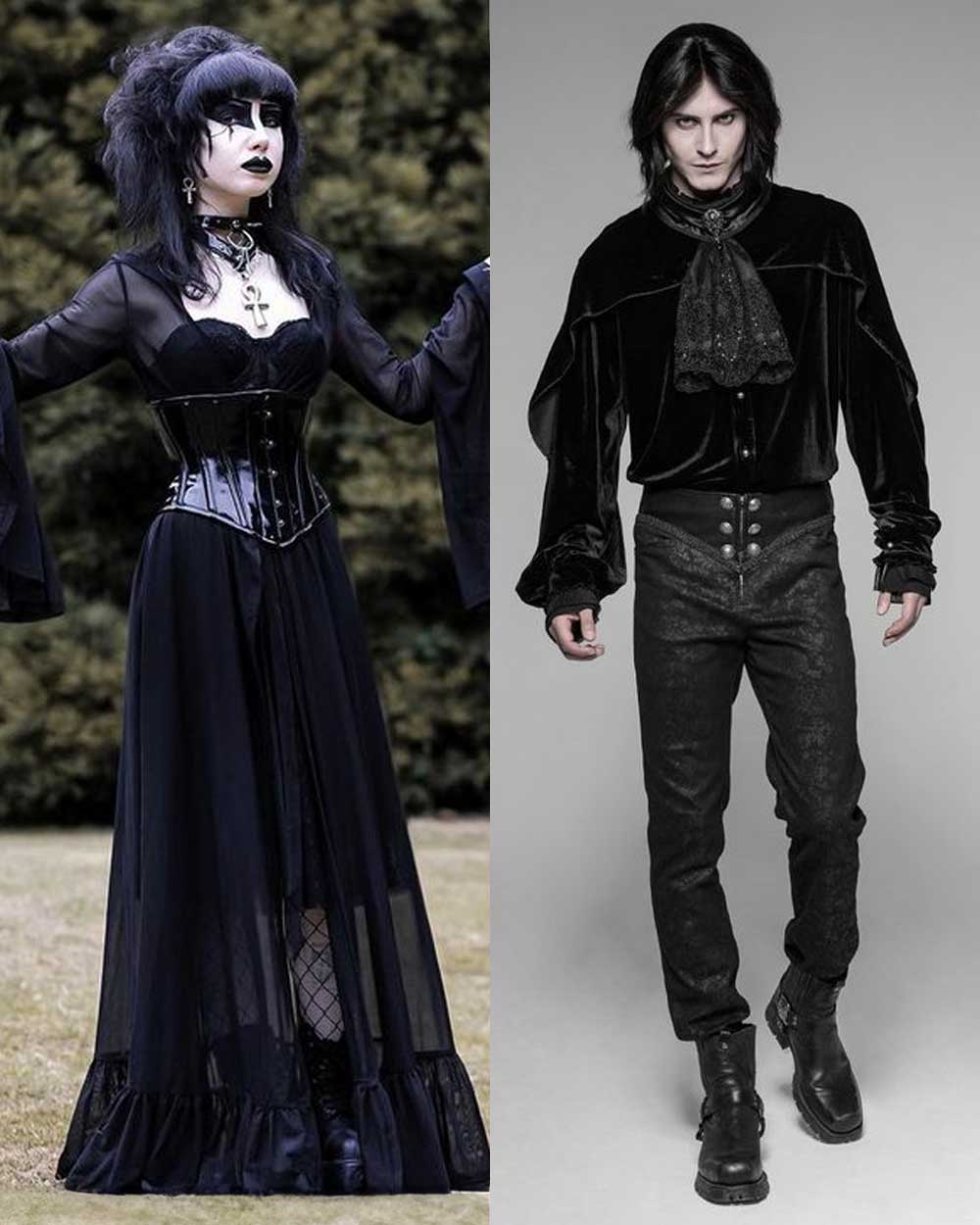
Popular among Vampire Goths, dark and curly hairstyles, ghoulish teeth, and long, pointed nails intensify the eerie aesthetic for a dramatic, spooky effect.
Intricate metallic accessories complement the mysterious look, while the pale complexion, ranging from white to a yellowish hue, enhances the vampiric appearance.
5. Cybergoth
The Cybergoth subculture emerged in the late 1990s as a futuristic, vibrant offshoot of traditional Goth culture.
Compared to typical gothic looks in black and purple, Cybergoths prefer black leather garments and accessories in neon colours.
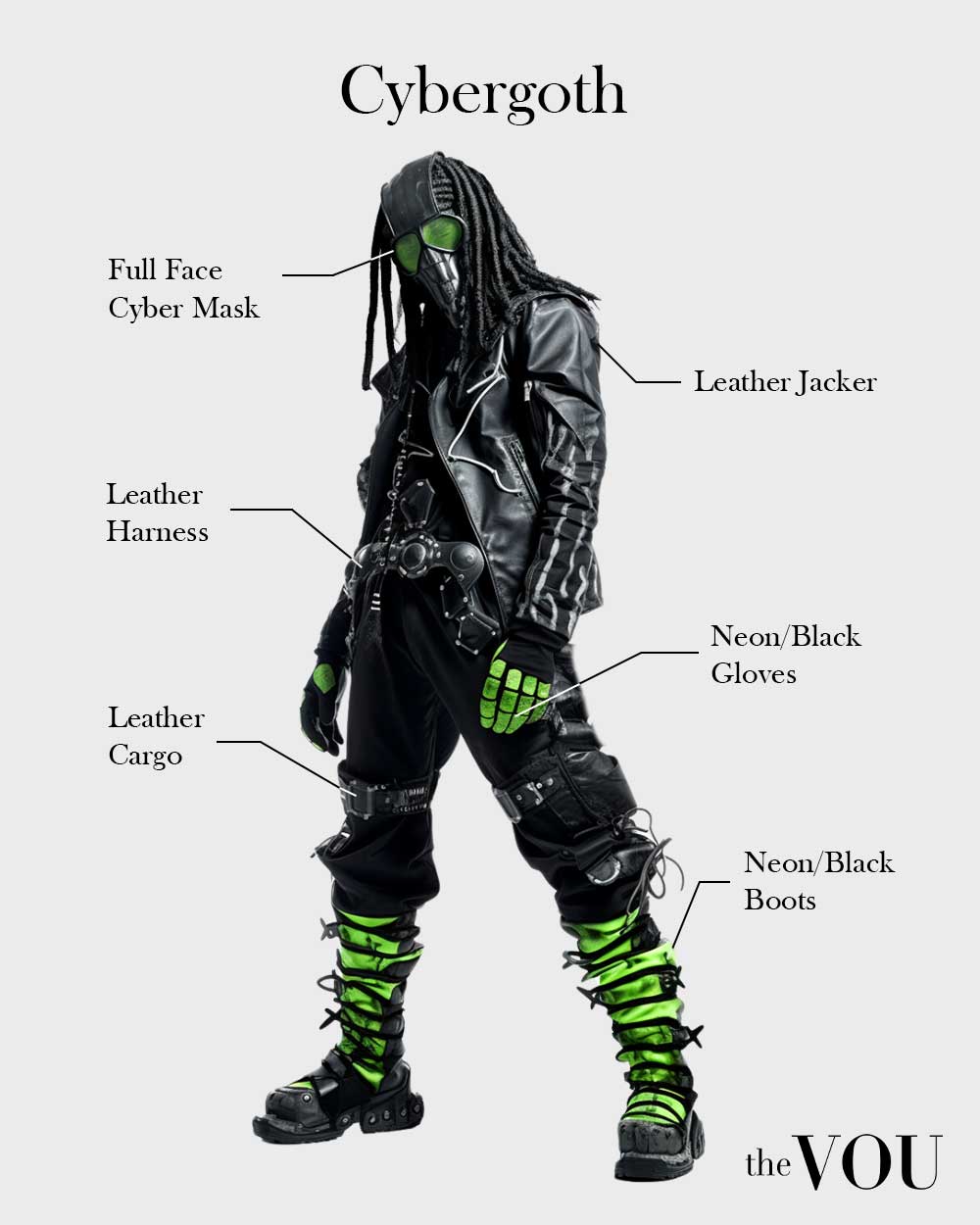
The style prefers glow-in-the-dark accessories and cybernetic enhancements, like goggles, gas masks, hair extensions in neon colours, platform boots, and piercings.

Signature clothes such as “cyberlockers,” furry leg warmers, fishnet stockings, coloured eye contacts, ultraviolet hair, and symbols of biohazard and radioactivity abound in Cybergoth styling.
Prominent figures within the Cybergoth community include Dani Filth, Rei Ayanami, and Kerli.
6. Glam Goth
The Glam Goth look emerged during the late 80s by merging the sombre undertones of the Gothic aesthetic with the opulence of Glam Rock of the 70s and the New Romantics movement of the 1980s.
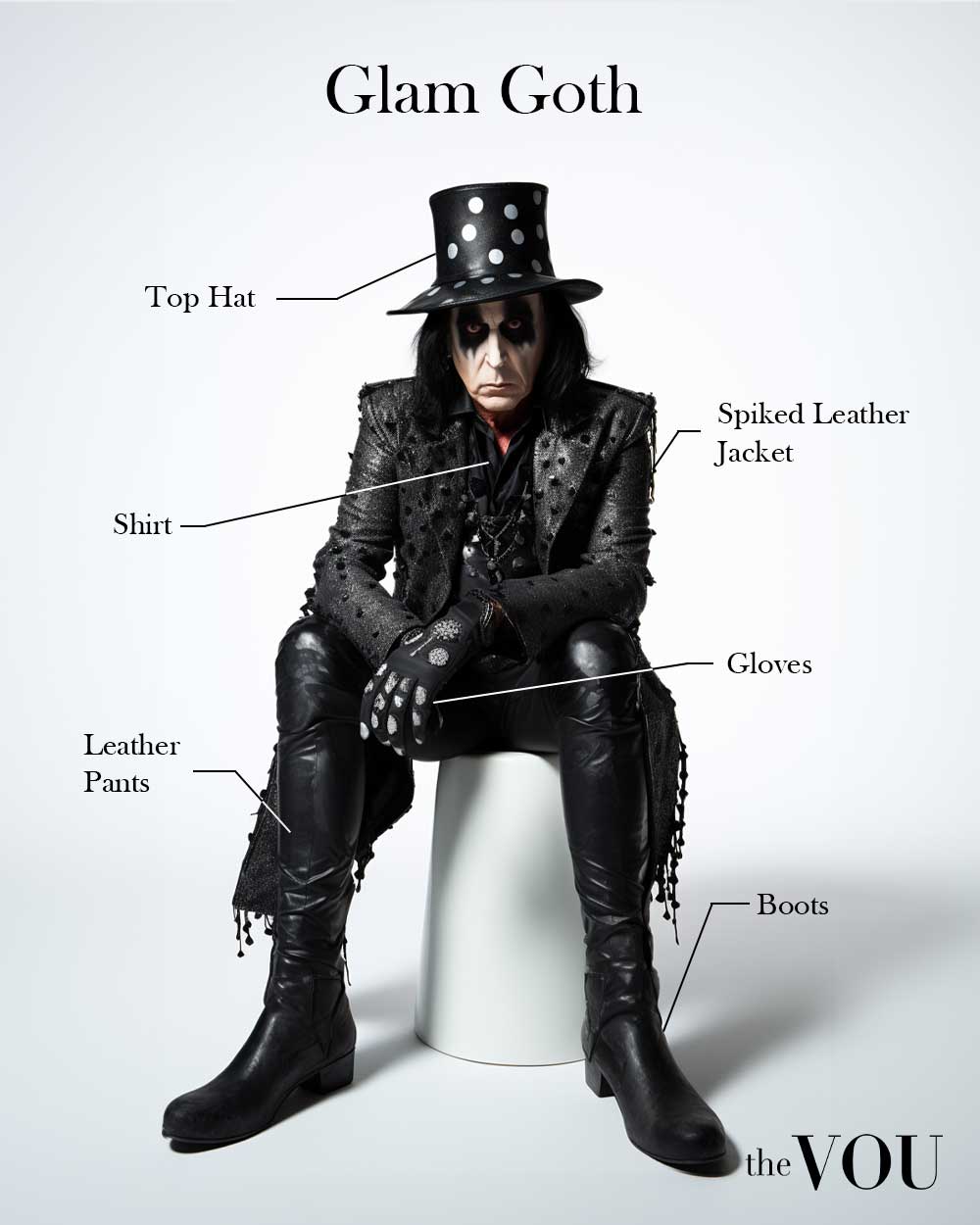
Emphasising dark, ecclesiastical imagery like crosses while incorporating studs and leather, the colour palette extends beyond the typical dark by incorporating red, plum, chocolate brown, and Bordeaux.

Inspired by New Wave artists like Ultravox, Visage, Gary Numan, and Glam Rock artists like Alice Cooper and Lou Reed, the garments have a subtle androgynous feel, a distinctive trait of Glam Goth.
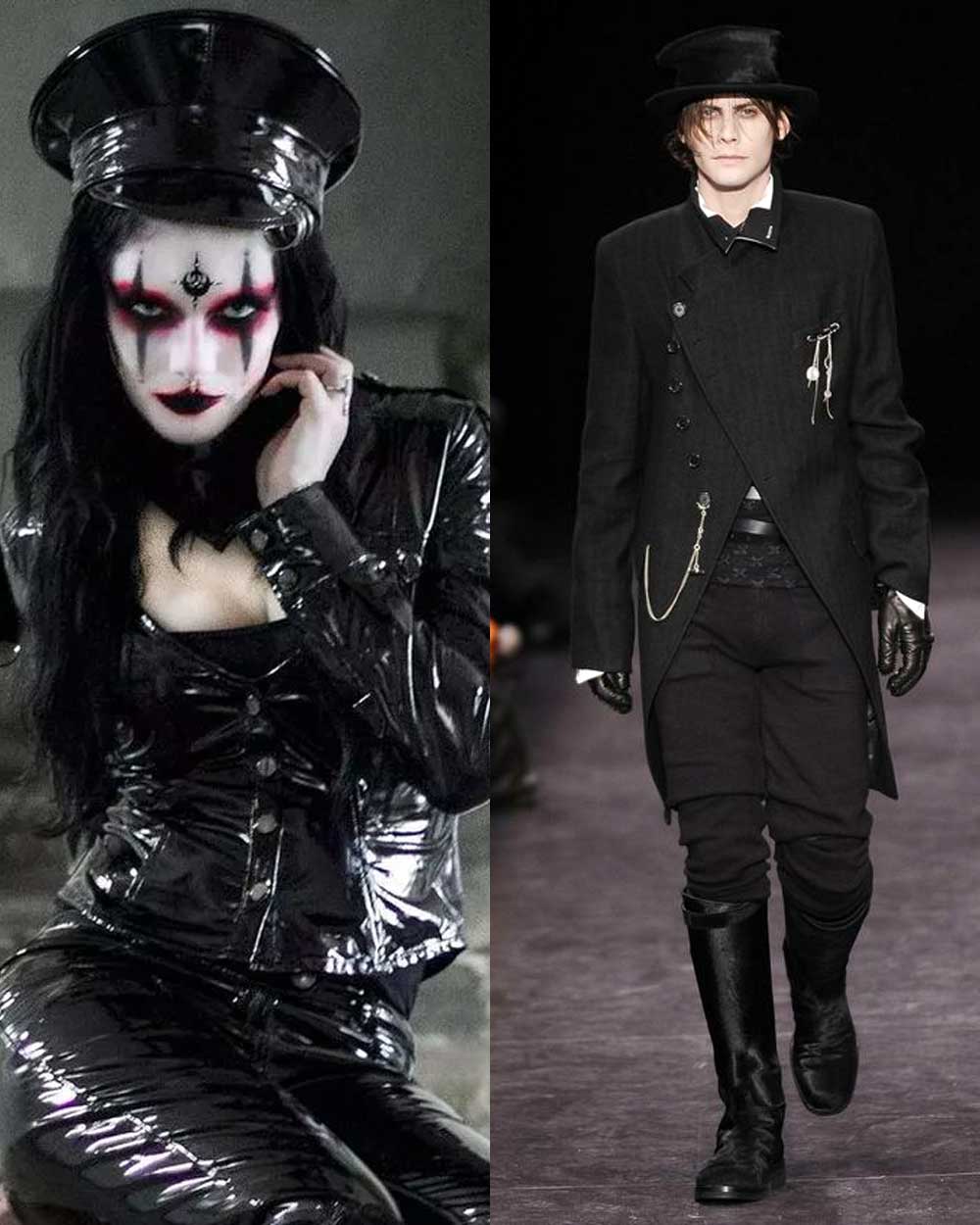
Jewellery is essential in nailing the Glam Goth: chokers with grommets, spikes, and amulets combined with black, platform, lace-up combat boots, heavy makeup, and frilly, dandyish outfits.
7. Pastel Goth (Kawaii Goth)
Pastel Goth, or Kawaii Goth, is a distinctive sub-genre that interweaves traditional gothic aesthetics with Japanese Kawaii in playful and colourful ways.
Central to Pastel Goth fashion is a contrasting colour palette that combines black with soft pastel shades, such as baby pink, baby blue, lavender, mint green, and lilac.

The outfits feature a black top emblazoned with occult or religious prints, paired with a mini skirt in black and pink.
Over-the-knee socks and edgy leather high-heel boots or platform shoes complement this ensemble.
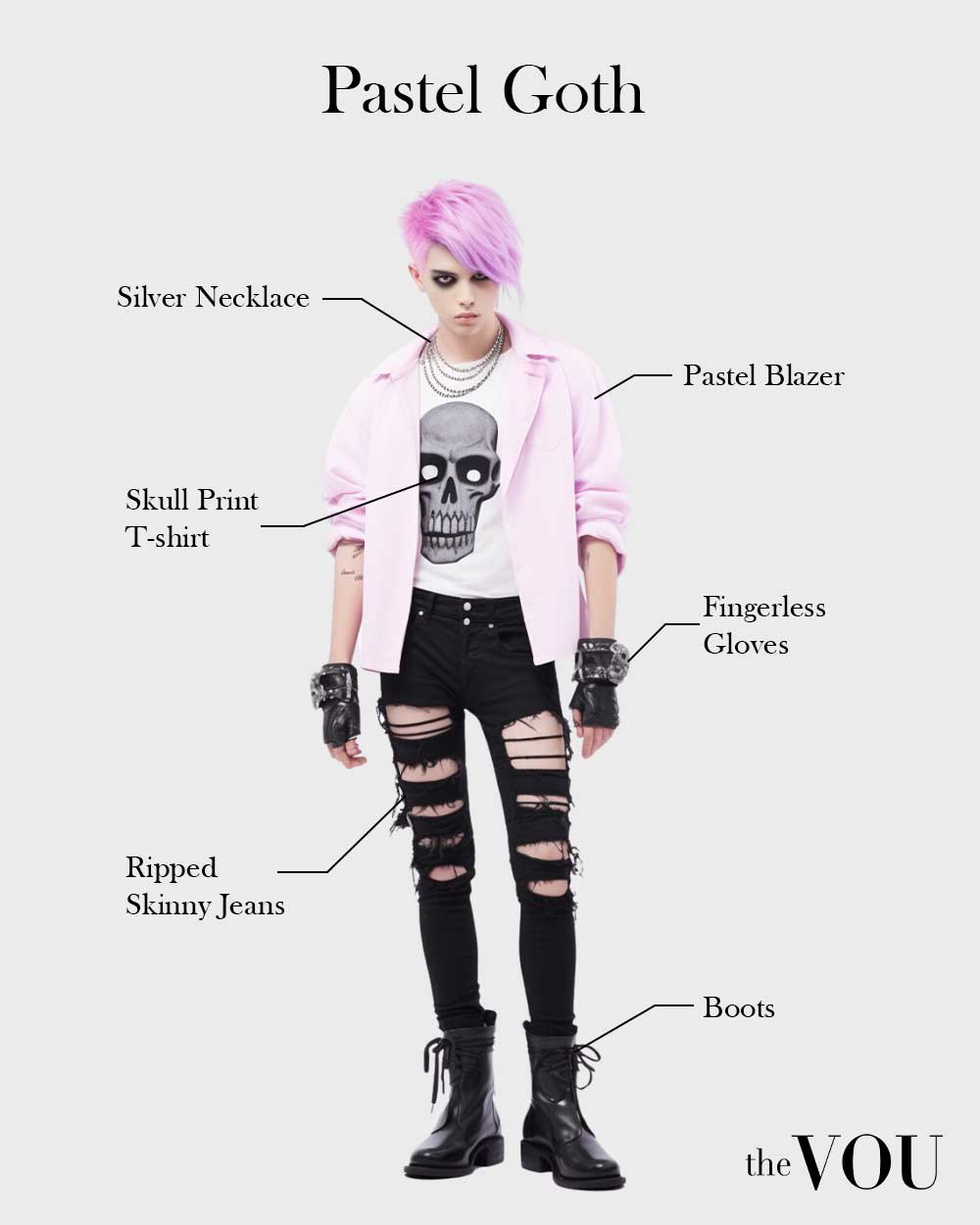
Pastel Goth borrows gothic motifs such as skull prints, cross necklaces, spikes, and chokers and integrates them into this candy-coloured aesthetic.
A notable divergence from traditional Goths is the makeup; instead of the classic black and white gothic look, Pastel Goths feature pink and baby blue eyeshadows for a softer, youthful vibe.
Similarly, hair is dyed in shades of pink, blue, or purple, combined with black, enhancing the blend of darkness and pastel hues.
Prominent icons of the Pastel Goth include Melanie Martinez, Venus Angelic, Jazmin Bean, and Moriah Rose Pereira, also known as Poppy.
8. Hippie Goth
Hippie Goth marries two distinctive cultural ideologies – the carefree, peace-loving attitude of the hippies and the intense, mysterious vibe of the Goths, where bohemian freedom meets gothic darkness.
The strategic juxtaposition of light characterises fashion that leans towards Hippie Goth, flowy bohemian apparel with sinister-looking black lace, leather, and metallic embellishments.

In this unique look, there’s a harmonious balance between the light and the dark, mystical and grounded.
Accessories such as wide-brimmed hats, silver jewellery, and dark sunglasses are integral to the Hippie Goth look.
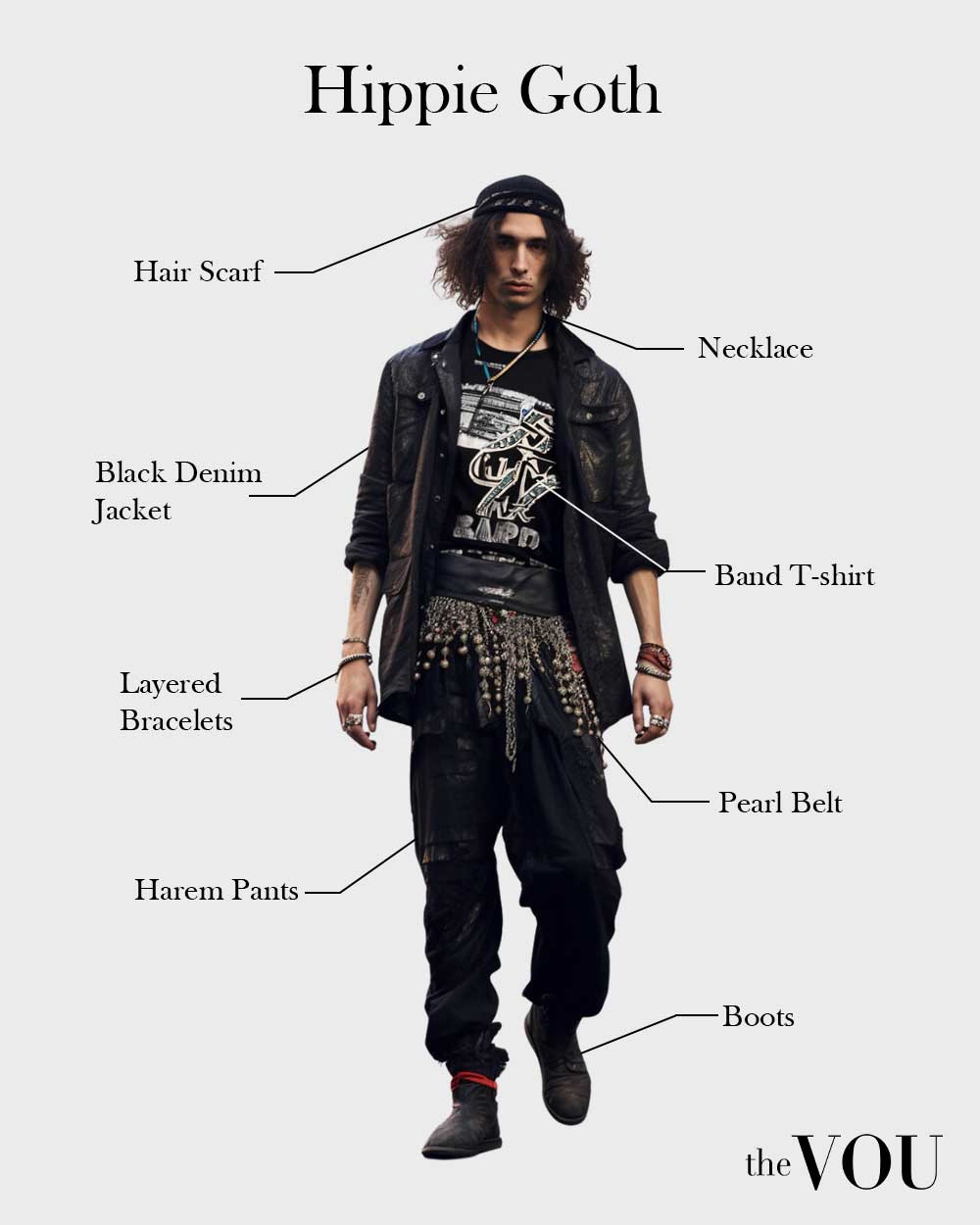
Hippie Goths prefer flowy hippy outfits with splashes of darker, gothic components and accessories like black bandanas and oversized rings.
Moreover, the hair and skin colour lean toward pale and dark tones, emphasising the characteristic contrast inherent in the Hippie Goth aesthetic.
Hippie Gothic fashion icons like Brian Molko and Lorde have made the look famous.
9. Corp Goth
Corp Goth fashion style merges corporate attire’s prim and proper realm with the captivating allure of Goth fashion, offering a sophisticated look yet laced with a touch of dark intrigue.
Corporate Goth fashion is recognised by tailored black suits or dresses, conjuring a sleek, professional image infused with gothic elements like leather boots, chokers, and silver jewellery.

Makeup in the Corporate Goth realm is intense and dramatic: strong red lips and smoky, mesmerising eyes.
The style allows individuals to express a unique persona within the confines of a professional environment while being professional yet non-conformist, corporate yet creative.
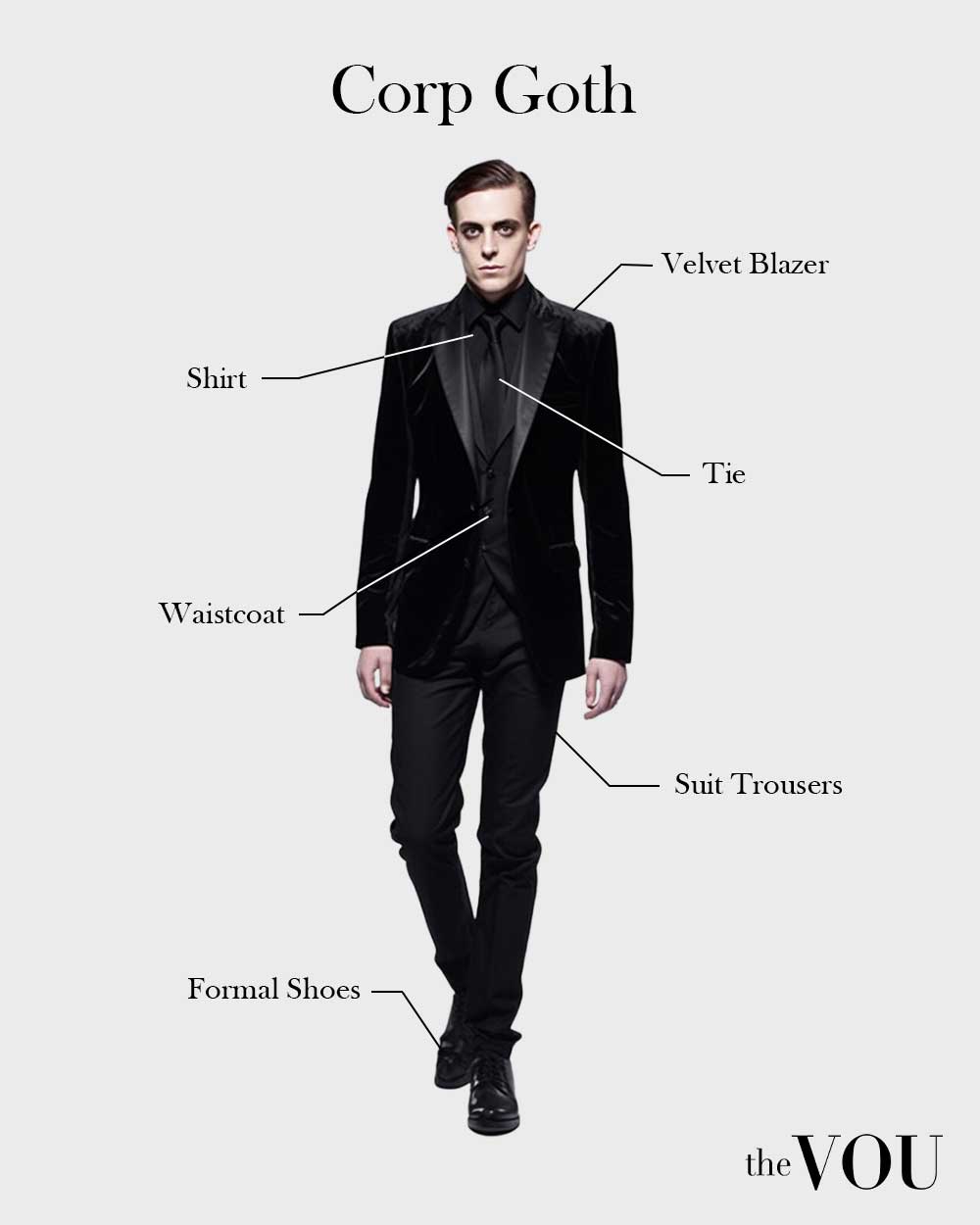
Hanako Arasaka, Dead Can Dance, and Alexander McQueen have influenced the Corporate Goth style by showcasing that one can wear corporate attire blended with gothic aesthetics and still create a professional impression.
10. Victorian Goth
The Victorian Goth style is an intriguing subculture that emanates an air of antique elegance, drawing inspiration from the black mourning attire prevalent during the Victorian era.
A distinctive Victorian Goth look involves long, elegant ballgowns that emulate Victorian aristocracy, wealth, status, and an aura of royalty.

The style features black dresses crafted from intricate brocade fabrics, complete with a fitted bodice and corset, accompanied by men’s black suits.
Adding a touch of mystery are the lace veils and the dark, smoky eye makeup, both integral to this vintage-infused aesthetic.
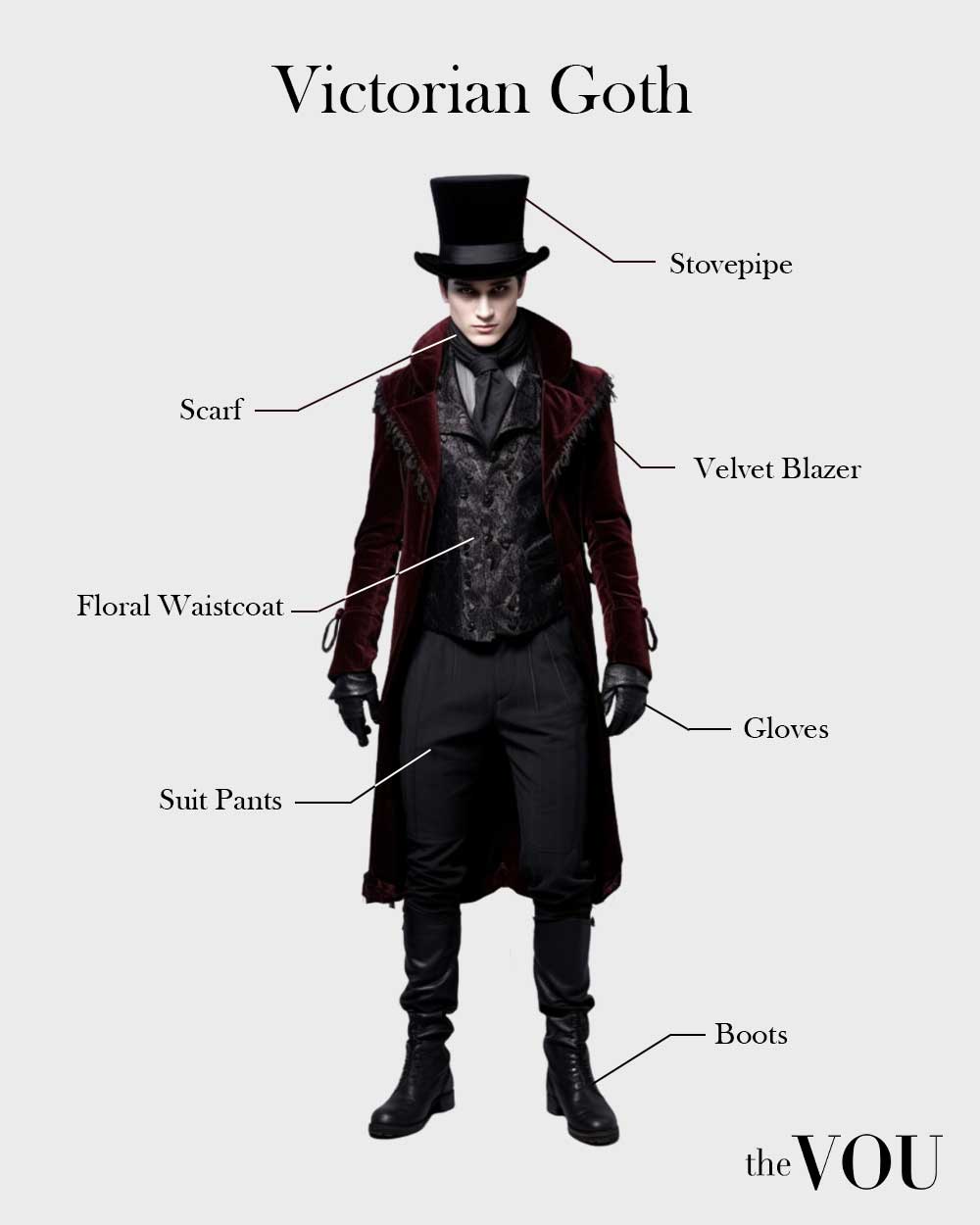
Accessories common to Victorian Goths, such as skull-themed rings, tees with wilted roses, and silver cross jewellery, mirror this fascination with death and the ethereal.
Jewellery is also crucial to this style, with pieces like choker necklaces adding an elegant touch to the ensemble.
Much like traditional Goths, Victorian Goths sport pale skin and long hair, and their makeup involves smoky eyes paired with soft lips, lending a delicate balance between bold and subtle.
In homage to the elegance and aristocratic charm typical of the Victorian era, Helena Bonham Carter and Vanessa Ives stand out among the renowned figures embodying the Victorian Goth style.
11. Medieval Goth
Drawing inspiration from the Dark Ages, the Medieval Goth style is a captivating blend of sombre aesthetics interwoven with historical.
This unique style adopts a palette of black or dark hues, accentuated with rich, textured fabrics such as velvet, lace, and leather that hark back to the era of knights and castles.

The quintessential Medieval Goth attire incorporates long, flowing dresses and robes, hugging corsets, tunics reminiscent of the Middle Ages, and dramatic capes accessorised with chokers, crowns, jewellery, and intricate headpieces.
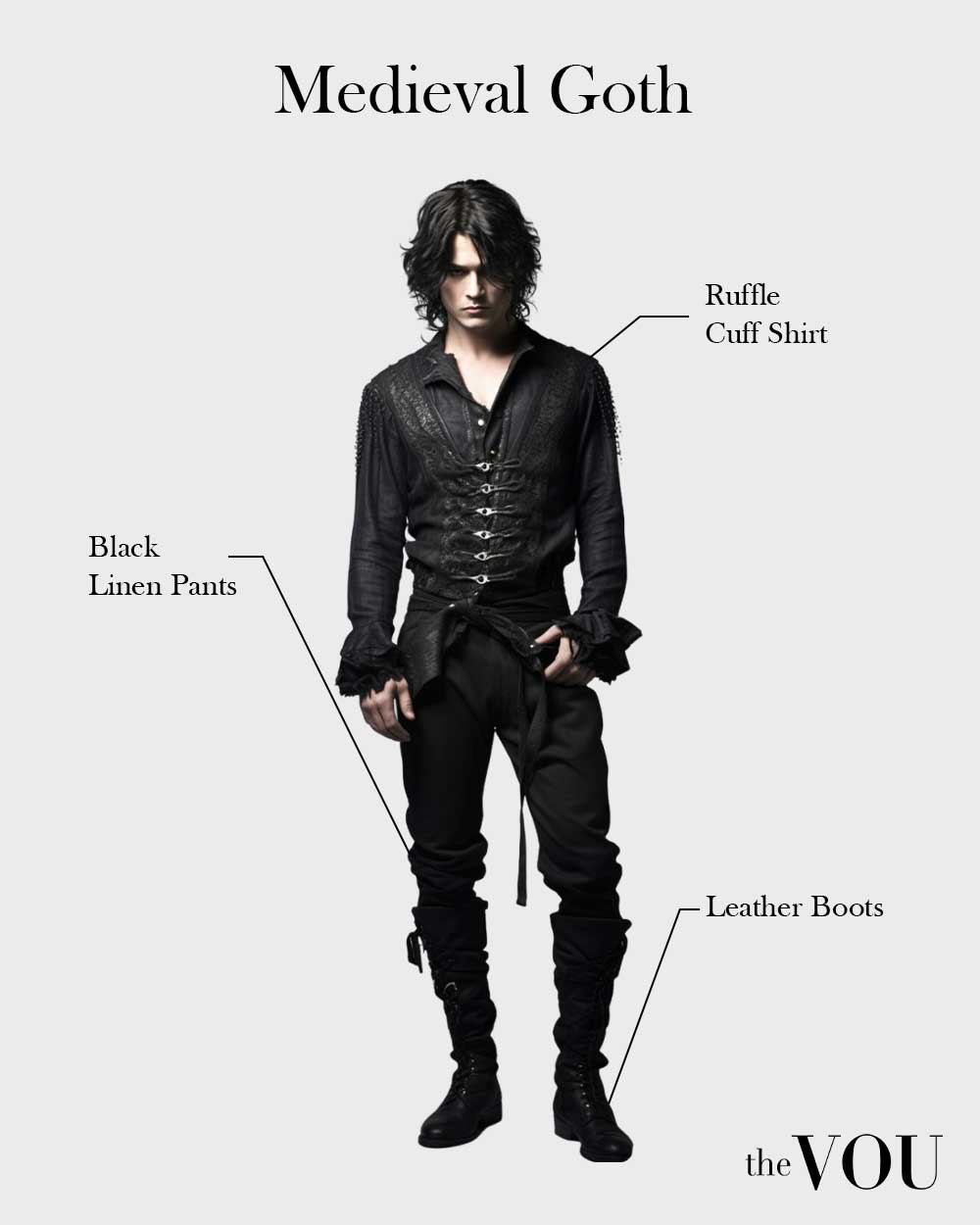
Dead Can Dance, and Sharon den Adel are among the Medieval Goth fashion style icons.
12. Health Goth
One of the most intriguing offshoots of the Goth subculture is the advent of Health Goth during the 2010s.
The trio shared images depicting hi-tech, dystopian styles and artwork, where ‘health’ conjured up images of sterile environments, biomechanics, and transhumanism.

What began as an internet meme transformed into a real-life fashion phenomenon, with Health Goth fashion style showcasing black, futuristic sportswear that draws aesthetic inspiration from the realms of science fiction.
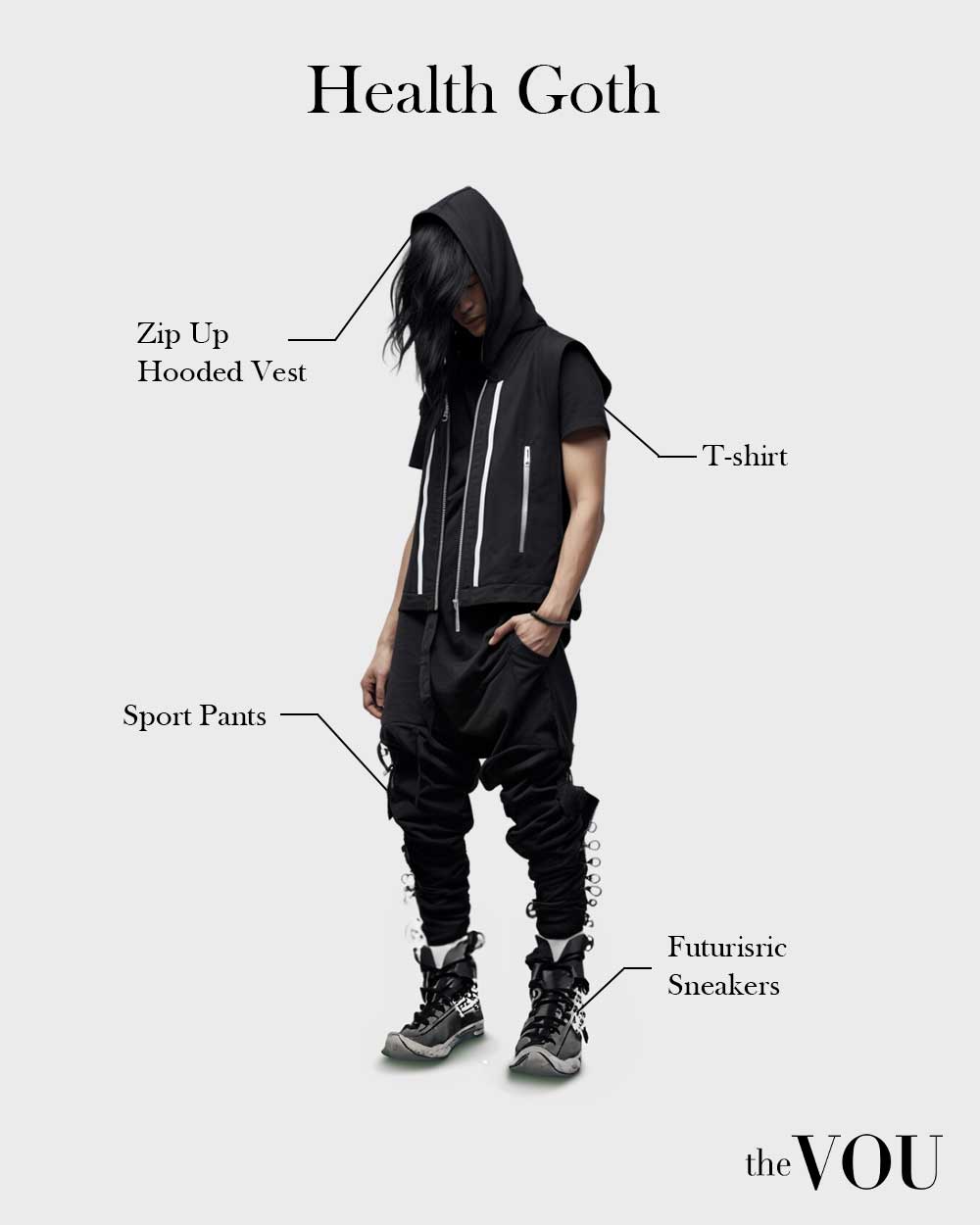
The designs are reminiscent of the costumes from iconic films like The Matrix and Blade Runner but not exclusive to Goth-rock fans; enthusiasts of hip-hop, grime, techno, and electronica genres are also sporting this trend.

Overall, the Health Goth is a contemporary interpretation of the goth look, designed for the 21st century and beyond, linked to the sports Goth look popularised by US metal bands like Korn in the late 90s.
Even mainstream sportswear brands such as Nike and Adidas have caught onto the trend, producing workout wear inspired by the Health Goth style.
13. Industrial Goth (Rivethead)
Emerging in the 80s – parallel to Goth in the US – the Rivethead (Industrial Goth) dressing style represents a unique marriage of a darker, grittier expression with the strictness of military aesthetics and industrial elements of metropolitan areas.
Aesthetics of punk fashion, such as mohawks dyed in striking colours and fetish wear featuring black leather and PVC, are typical in the Rivethead fashion style.

The style integrates modern primitive body modifications like tattoos and piercings to emphasise a post-apocalyptic, dystopian influence inspired by movies like Mad Max and Strange Days and novels like William Gibson’s Sprawl trilogy.
Rivethead fashion embodies a stripped-down, utilitarian aesthetic as “street survival wear.” The idea is to make a statement with as few fashion components as possible.

Male attire includes black, grey, or olive tank tops, cargo pants, combat boots, shaved heads, or with dreadlocks or Mohawks.
Accessories incorporate industrial nails, screws, cogs, black PVC and leather corsets, miniskirts, and stiletto boots.
The style is popularised by the subculture’s icons like Marilyn Manson, Trent Reznor, and Emily Autumn.
14. Emo Goth
Introduced in the late ’90s and early 2000s, the Emo Goth fashion style is built on the fusion of Emo aesthetics and Goth music influences.
The Emo subculture, shorthand for Emotion or Emotive Hardcore, has roots in alternative rock, metal, and Grunge music and is very popular among teenagers.

Instead, Emo Goth fashion is casual and comfortable, with a staple wardrobe and skinny jeans, band t-shirts, and Converse sneakers or boots.
Still, Emo Goth fashion incorporates a darker, sleek Goth aesthetic.
It’s not uncommon to see dark eye makeup and dark hair, either styled sleek or voluminous.
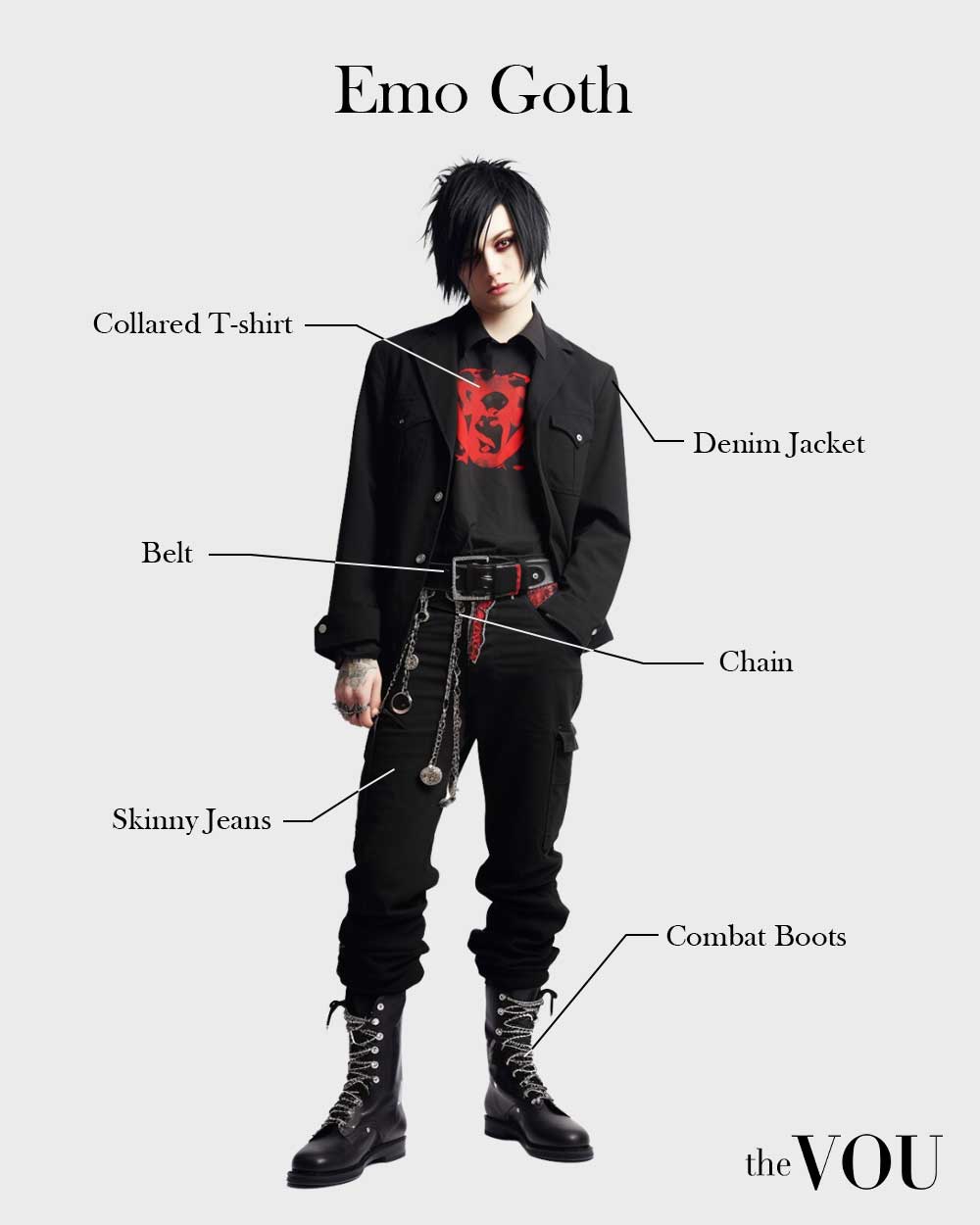
Accessories feature symbols associated with Goth culture, such as skulls, bats, and coffins.
Leather accessories or jackets, along with studded bracelets and belts, may be included to infuse the look with a hint of punk edginess.
Piercings on the nose, eyebrows, lips, and ears are common, and in line with other Goth types, pale skin is a characteristic trait of Emo Goths.
15. Mopey Goth
Mopey Goths, seen as the archetypal representatives of the Goth subculture, are marked by a distinct sense of not fitting in with society, using symbolic use of black associated with mourning and melancholy.

Black eyeliner is applied on pale skin, contrasting with dark clothing and makeup to resemble tear streaks as a symbolic representation of crying.
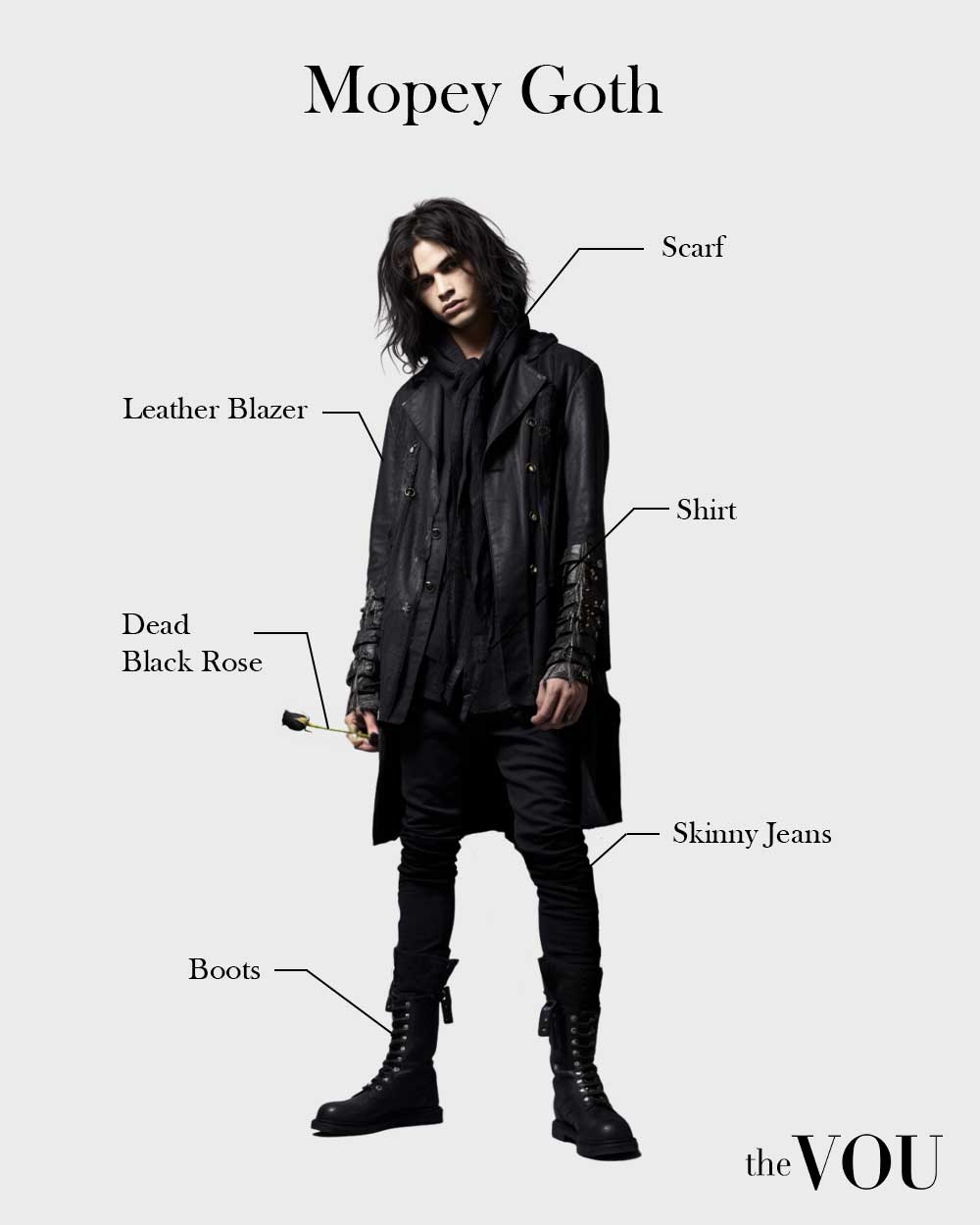
Mopey Goth blends black mourning clothes, corsets, chokers, and metallic accessories.
It is common to see a Mopey Goth carrying a symbolic dead black rose, adding a theatrical element to their persona.
16. White Goth
White Goth or Ice Goth flips the traditional Goth style by embracing white instead of black.
White aligns well with the Goths’ interests; it is the colour of ghosts, bones, cobwebs, and the symbol of death in many cultures.

White is also great under UV lights, a common feature of Goth clubs, for creating an ethereal appearance.
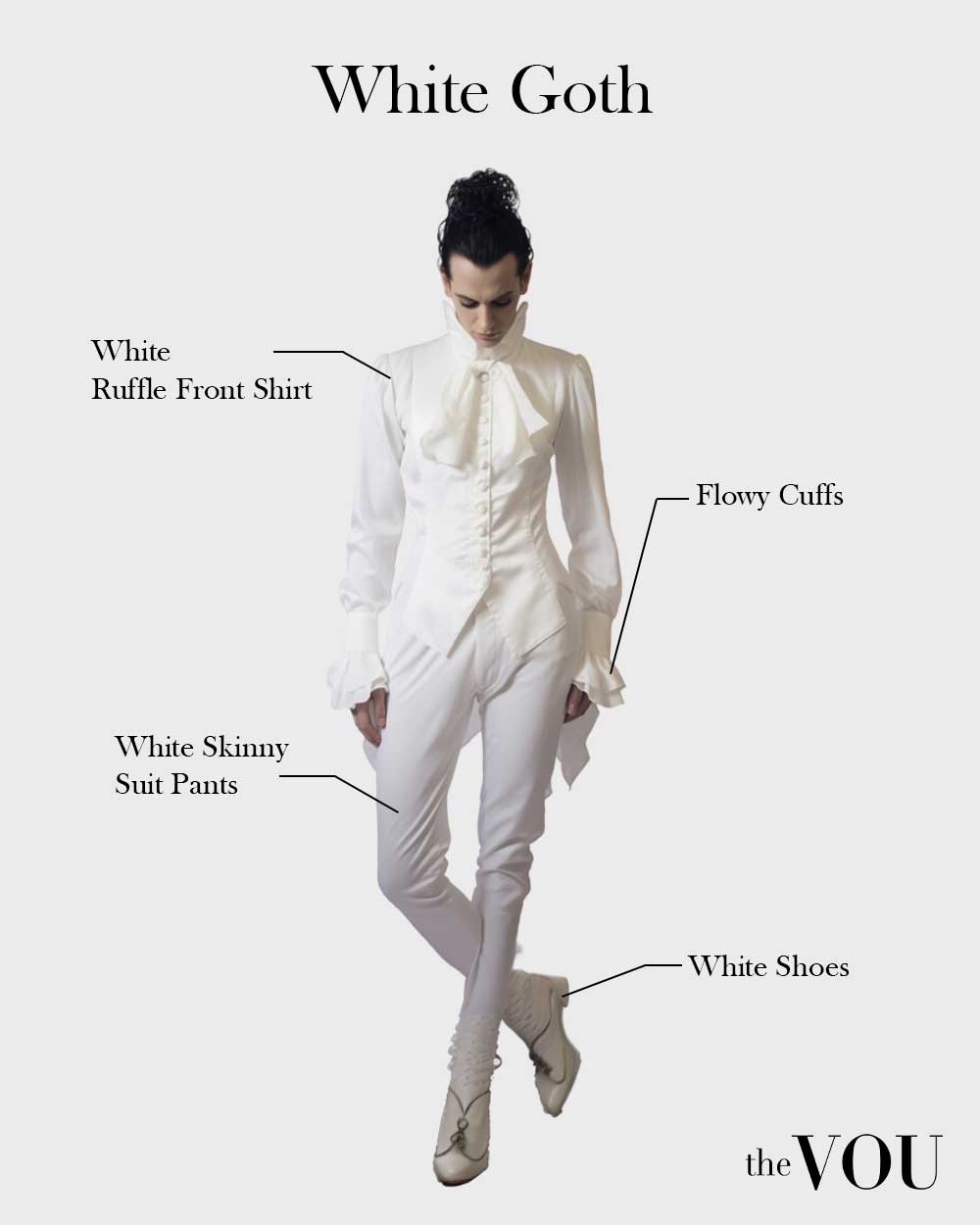
However, White Goths should avoid wearing black underwear as, in the rain or under specific lighting, it becomes visible under white clothing.
As for makeup, White Goths aim for a pale, almost ghostly complexion via powder or foundation that lightens the skin to match the ivory attire.

White Goth look is seen in The Matrix sported by the Switch characters or in music, with bands like Tones on Tail, Cocteau Twins, and Lacuna Coil adopting the look.
17. Gothic Lolita
Gothic Lolita, or GothLoli, is a fashion style that merges the aesthetics of Western Goth fashion with the intricacies of the Japanese Lolita style.
Unlike other gothic styles, Gothic Lolita is characterised by a polished, cute, and conservative appearance. Makeup is applied in a soft and feminine style using natural shades of pink, red, and brown.
This eclectic fashion style uses a palette of dark colours and a substantial amount of black.

Platform boots are replaced with low to mid-height Mary Janes and Tea Party shoes, and lace umbrellas, wigs, and knee-high socks add to the overall aesthetic.
The attire has Victorian-era details such as lace and ribbons, which look vintage and nostalgic.
Gothic Lolita style incorporates petticoats, bloomers, bell-shaped skirts or dresses, and tailored blouses in black adorned with frills and buttons.
Accessories and prints are crucial in creating the Gothic Lolita look; bats, coffins, crosses, rosaries, top hats, headbands, bows, and parasols are critical. Footwear consists of black Lolita boots or Mary Jane shoes adorned with bows.
Gothic Lolita was introduced by a Japanese musician and was adopted by prominent GothLoli icons such as Moon Kana, Caroline Charonplop Kyary, and Mana.
18. Pin-up Goth (Gothibility)
Pin-up Goth is an exotic and unusual amalgamation of different styles: Elvis Presley’s flair, the rock rhythms of The Cramps, the vintage feel of old horror movies, and a hint of lounge style.
Gothabilly has its roots in “Rockabilly,” a style derived from American 1950s rock n roll, and “Psychobilly,” a subgenre that emerged in the 1980s, combining punk rock with a strong rockabilly influence.
In a nutshell, Gothabilly is a fascinating blend of the playful and the macabre, incorporating bright colours, retro aesthetics, and a distinct rock and roll edge; think Dita Von Teese style.

Accessories are essential to the Gothabilly style, with common choices for platforms, garters, corsets, and cherry-themed jewellery.
The bright colours of the outfits contrast with the vivid tattoos, a key feature of the Gothabilly aesthetic.
This subculture is striking and diverse, standing out for its vibrant tattoos, cherry accessories, and ever-present polka dot clothes.
Drawing inspiration from the iconic 1950s fashion icon Bettie Mae Page, Gothabilly embraces the seductive aura of Page’s raven black hair, deep red lipstick, and coloured outfits.
19. Cabaret Goth
Cabaret Goth style originated from burlesque shows, essentially the seductive striptease performances of earlier times when revealing anything other than an ankle was seen as risqué.
The attire of a Cabaret Goth is characterised by corsets, garters, fishnet stockings, feather accessories, and dresses that follow either a mermaid style or feature a mid-thigh length front with a trailing back piece.
Makeup leans towards the bold side, featuring smokey eyeshadow, a defined cat-eye liner, and a striking red lip.
Male Cabaret Goths don tiny bowler hats and suits featuring patterns like pinstripes paired with a bowtie.
The result is a unique blend reminiscent of Dracula, Charlie Chaplin, and a mime, but with a distinctive class.
One notable influencer of this style is Dita von Teese, the first wife of the metal musician Marilyn Manson, known for her burlesque fashion choices.
Artists like Siouxsie and the Banshees, Voltaire, Sex Gang Children, and the infamous Tiger Lilies have experimented with burlesque imagery and music.
Marilyn Manson has also dabbled in this style, mainly by associating with Dita Von Teese.
20. Tribal Goth
Tribal Goth emerged when Goths took an interest in belly dancing, creating a new and unique subculture. Its mysterious, sensual allure and association with goddess worship resonated with the Gothic aesthetic.
As Turkish and Egyptian belly dancing grew in popularity in the USA, it birthed a new style, “tribal.”
 Tribal Goths share aesthetic similarities with Hippy Goths, sporting longer hair or dreadlocks, inspired by belly dancing costumes, modified with black dye, or adorned with gothic elements such as lace to add a darker touch.
Tribal Goths share aesthetic similarities with Hippy Goths, sporting longer hair or dreadlocks, inspired by belly dancing costumes, modified with black dye, or adorned with gothic elements such as lace to add a darker touch.

Traditional tribal clothing, such as shirts and pants embellished with faux furs and bone or wood decorations, is also standard.
Hairstyles associated with Tribal Goth include dreadlocks and long, unkempt hair. Dark, smokey makeup complements the look, and tribal tattoos are favoured.

The “tribal” aspect of the style is accentuated with accessories crafted from organic materials like shells, bone, and wood.

In the past, “Tribal” Goth was a term used to describe Goths who dabbled in primitivism, adopting elements like bone jewellery, dreadlocks, beads, braids, and heavy body modification.
This subculture mirrors the original Goth tribe, the Visigoths, who inspired the term for the goth scene.
21. Trad Goth (Batcave)
Traditional Goth or Trad Goth (AKA Batcaver) style is a unique canvas reflecting the 1980s Gothic scene.
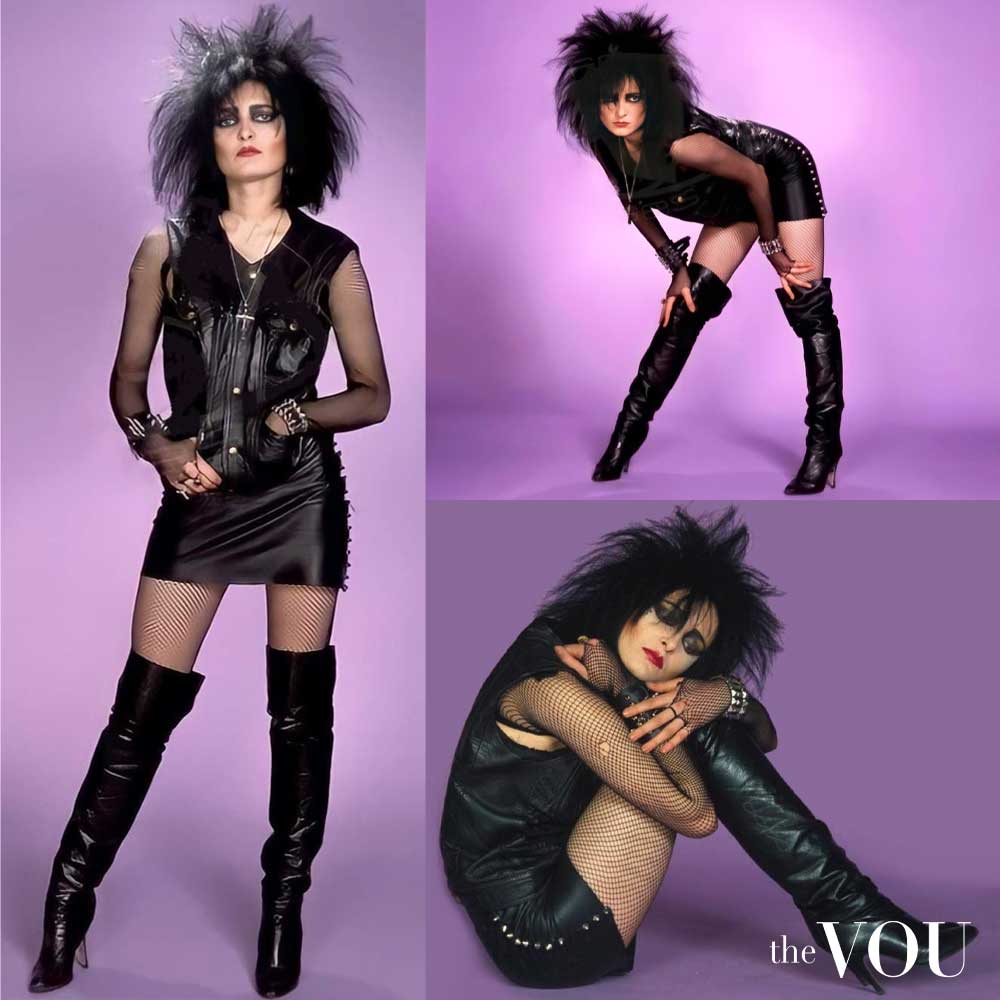
The colour palette is predominantly black, with occasional deep red or purple accents.

The Trad Goth style clothing comprises black leather jackets, black leather skirts or pants, fishnets, and black t-shirts with prints from brands like Punk Rave and Devil Fashion.
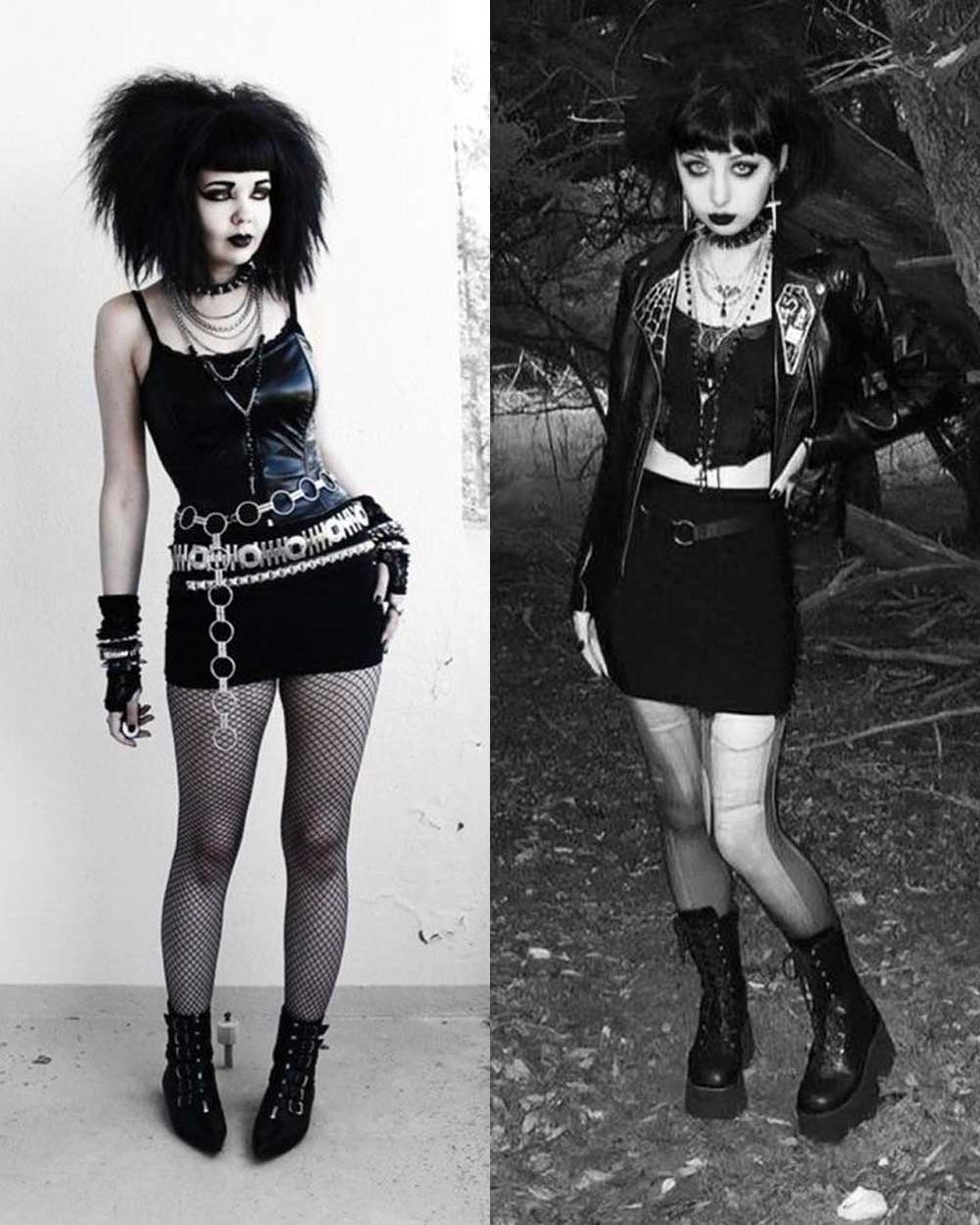
Footwear includes Demonia Cult’s Victorian-style ankle boots or Dr. Martens’ classic 1460, ornated with buckles, chains, and lace.

Teased hair and dark makeup and the main components of a Trad Goth look.
Chokers, necklaces, silver ankhs, bat-shaped pendants, and accessories with religious or occult symbols from Alchemy Gothic work wonders with Banned Apparel’s Gothic motif bags.

Notable icons of the Trad Goth fashion style include Siouxsie Sioux, Robert Smith, The Banshees, The Damned, Joy Division, Bauhaus, The Cure, The Sisters Of Mercy, The Birthday Party, and Einstürzende Neubauten.
22. Mall Goth
Mall Goth emerged in the late 1990s in response to the commercialisation of Goth culture by blending current fashion trends with traditional Goth garments.

The main colour of the MallGoth style is black, complemented with touches of grey, blue, pink, and green.
The Mall Goth style includes graphic band t-shirts, mesh tops, or corsets from Lip Service paired, Hot Topic’s bondage pants, or oversized cargos with chains from Tripp NYC.

Chunky platform boots from Demonia and New Rock are matched with chokers, spiked bracelets, band merchandise, wristbands, and studded belts.
Korn, Kittie, Slipknot, Marilyn Manson, Lip Service, Tripp, JNCO, and Demonia are some of the most iconic brands repping the substyle.

Fictional characters like Emily the Strange and Jack Skellington are symbols of this subculture, contributing to its unique visual aesthetic.
23. Nu Goth
As a contemporary evolution of Goth trad, Nu Goth conveys a fresh, streamlined approach to Goth fashion by infusing traditional Gothic attire with current trends.
 As showcased by Porcelain Black and Grimes – two renowned Nu Goth fashion style icons -the Nu Goth substyle revolves around traditional aesthetics and modern minimalistic trends.
As showcased by Porcelain Black and Grimes – two renowned Nu Goth fashion style icons -the Nu Goth substyle revolves around traditional aesthetics and modern minimalistic trends.

Male Nu Goths wear slim-fit jeans and black tees with grey and white accents, Dr Martens ankle boots, or Vans sneakers.
24. Fairy Goth
Fairy Goth takes its inspiration from mystical and fantastical themes, showcasing an affinity for the mythical creatures of fairytales over the typical Goth influences of vampires, werewolves, and witches.
Garments that fall into the Fairy Goth style have a fluid and ethereal quality, resembling long, flowing robes that could be straight out of a mystical tale.
Loose, flowing, wavy hairstyles and accessories like chokers, crowns, staffs, and wands add a layer of fantastical charm.
Those identifying with the Fairy Goth style lean toward lighter hair colours, as they enhance the ethereal, magical aura.
Makeup choices for men and women involve a pale foundation paired with a smoky eye makeup style.
Adding a striking piece of jewellery that resembles an enchanted emblem or stone enhances the overall look, and of course, a pair of wings is the perfect final touch.
Artists like Cocteau Twins, Black Tape for a Blue Girl, and The Changelings are popular among Fairy Goths, providing a melodic backdrop to this enchanting Goth style.
25. Bubble Goth
Bubble Goth is a new branch of the Goth subculture created by the Estonian pop singer Kerli Koiv, who added silver, white, black, and rhinestones to classic goth attire.
The look is completed with smoky makeup and neon hairstyles to create the unique mixture of colours and accessories that Bubble Goth represents.
Compared to Bubble Goth, Pastel Goth uses pastel and black colours with a strong Japanese influence, whereas Bubble Goth includes Cybergoth elements.
Must-Know Goth Clothing Brands
1. Void Clothing – Void Clothing, Based in Nottingham, UK, is an online store dedicated to Goth-style clothing, accessories, makeup, witchy incense, tarot cards, and runestones. The online store also offers unique creations from small alternative brands such as Poizen Industries and Darkside.
2. Dusturbia – Disturbia is a Goth clothing brand from the UK with a rebellious heart that creates collections conveying an alternative graphic narrative. The brand’s love for Alternative styles, infused with a propensity toward existentialist thought and alienation, informs the psyche of its superb products.
3. Fox Blood – FoxBlood is a full-scale modern noir online Goth clothing boutique run from the heart of downtown Los Angeles. The label was founded in 2017 by former red carpet stylist and stage wear designer Lindsay Hearts.
4. The Pretty Cult – The Pretty Cult was launched in 2015 as a creative outlet replicating the clothing of on-stage Goth musicians. Since then, The Pretty Cult has grown into a company based around its patrons’ individuality, whether misfits, dark hearts, or the magically inclined.
5. Punk Rave – Punk Rave is an Asian Gothic clothing brand founded in 2006, specialising in Gothic coats, Gothic Lolita dresses, Victorian mourning shirts, medieval jackets, leather pants, and leather accessories.
6. Rogue + Wolf – Rogue and Wolf is a Goth clothing brand specialising in occult-influenced apparel, accessories, jewellery, footwear, and witching gear. The brand’s clothing theme resonates with ‘Witchcore,’ a new aesthetic from TikTok and Tumblr.
7. Black Mast – Black Mast is a San Francisco-based Gothic clothing brand renowned for unconventional collections of glamourous Gothic motifs. Driven by the Black Mast’s co-creators, Marie and Brandon, the brand stocks Goth clothing inspired by other subcultures, themes, drag queens, buccaneers, and more.
8. Banned Alternative – Banned Alternative is a UK-based clothing brand Founded in 1990 in the fabled Camden Lock stalls of London, specialising in Gothic and alternative apparel with a pin-up charm and rock’n’roll attitude! Inspired by 1950s fashion, the brand blends retro styles such as Pin-up with classic Goth.
9. Jawbreaker Clothing – Jawbreaker, based in East London with our hearts still in old Camden Town, has become a new haunt for alternative fashion worldwide.
10. Spiral Direct – Spiral Direct is a UK-based alternative clothing catering to Metalheads. Far into the metal end of Goth fashion, Spiral Direct makes delightful ranges of dark Gothic Metal clothing.
11. Dr. Faust – Dr. Faust offers some of the most badass Gothabilly and Nu-Goth designs. Based in Glasgow, Dr. Faust is creating some of the most epic Goth designs on the site, drawing inspiration from Glasgow’s alternative scene.
12. Burleska – Burleska started in 2006 as an alternative clothing fashion brand specialising in Victorian, Elizabetian-inspired corsets. Nowadays, Burleska is one of the best Goth stores for elegant and classic Goth clothes and accessories with a neo-Victorian and Elizabethian touch.
13. Queen of Darkness – Queen of Darkness is one of the best German gothic clothing designers, and it is hard to put them in a stylistic box within the Gothic genre. The brand offers Corporate-style Goth clothing for those Batcavers who have adopted a corporate lifestyle as Goths.
14. New Rock – New Rock, established in 1980 and based in Spain, is hailed as the best Goth clothing brand for ultimate alternative clothing and footwear. The brand’s unique offering is: “There are shoe companies, and then there is New Rock.”
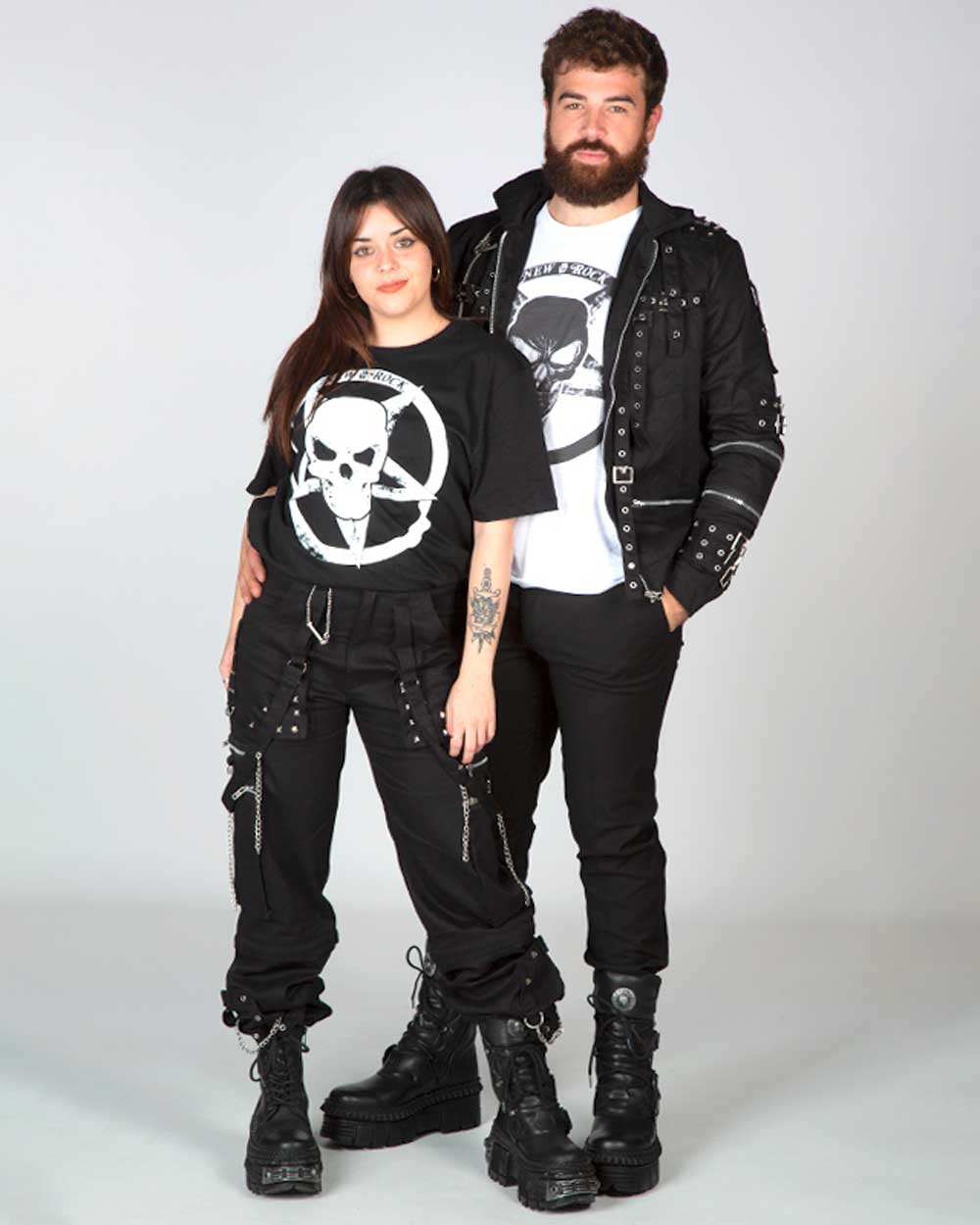
15. Long Clothing – Long Clothing, launched in 2008, defined over a decade of dark, Gothic, and alternative streetwear. Long Clothing represents a cutting-edge and contemporary culture where futuristic aesthetics, dark fantasy, occult mystery, and hyper-real imagery combine.
A University of Oxford graduate in Design History, Katherine Saxon is researching arising TikTok cultures from a consumer psychology perspective while covering emerging aesthetics in fashion and beauty for TheVOU, Forbes, Business Insider, and more.
After years of managing hundreds of fashion brands from London's office of a global retailer, Mandy has ventured into freelancing. Connected with several fashion retailers and media platforms in the US, Australia, and the UK, Mandy uses her expertise to consult for emerging fashion brands create top-notch content as an editorial strategist for several online publications.


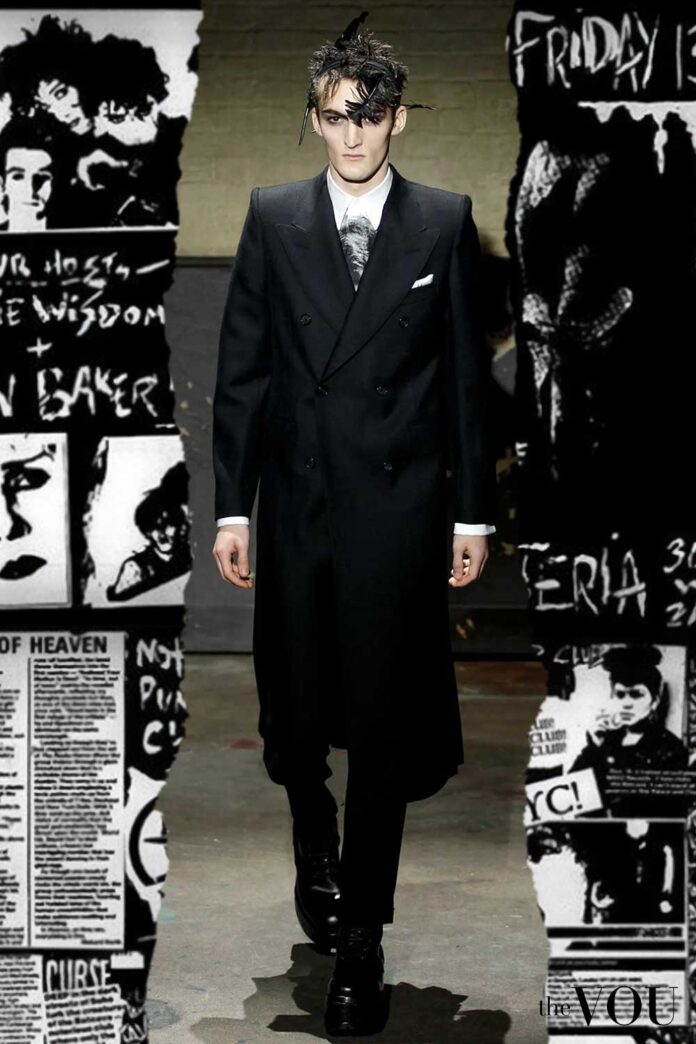
This is a wonderful story. Thank you for sharing it with us and I hope you’ll let me share my company’s offering with your audience, especially men interested in Gothic fashion. Many thanks!
Thank you so for teaching me, about the Gothic life style. Im a number one huge fan, about clothing cause I love black anything..I mean everything.